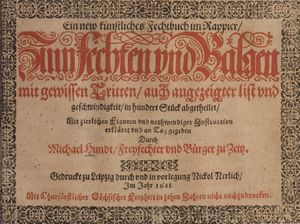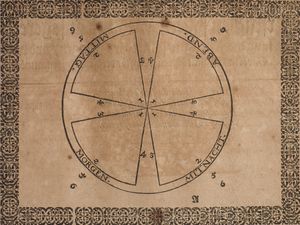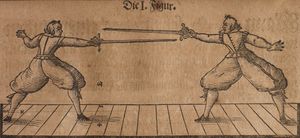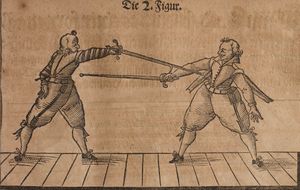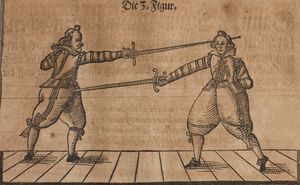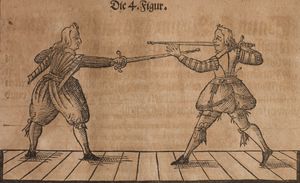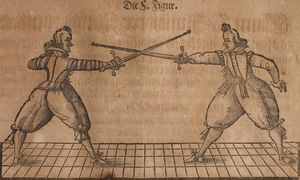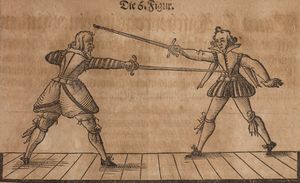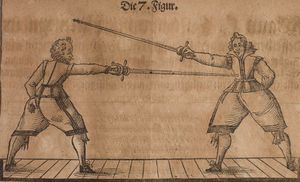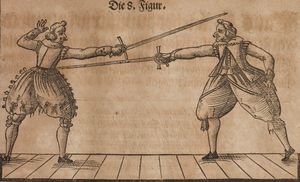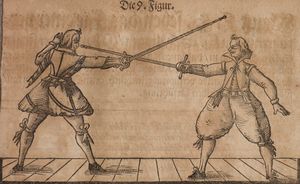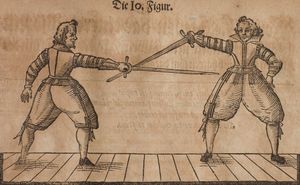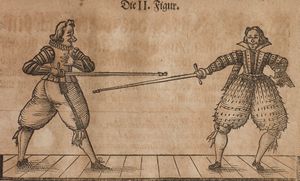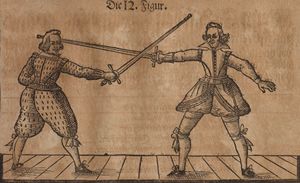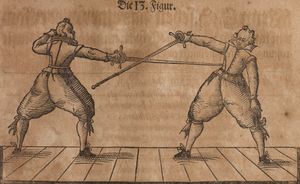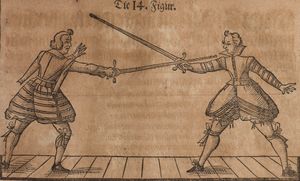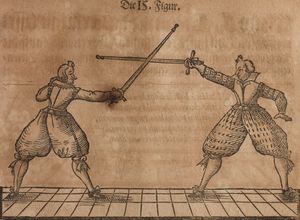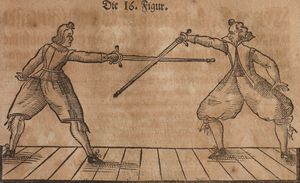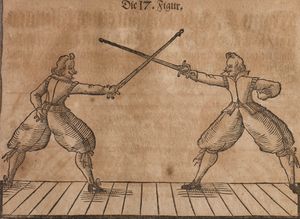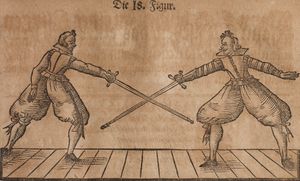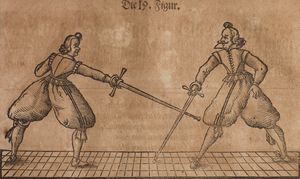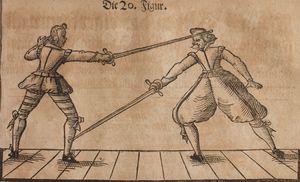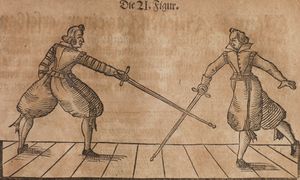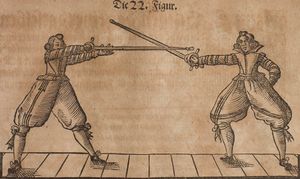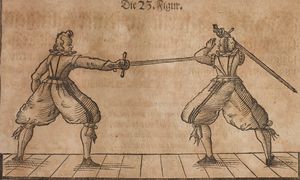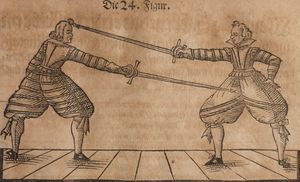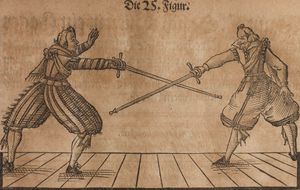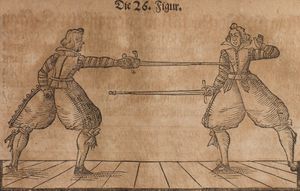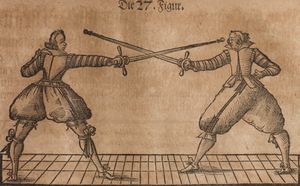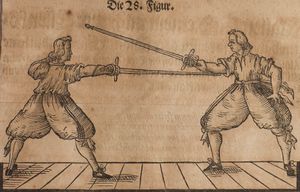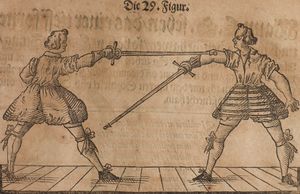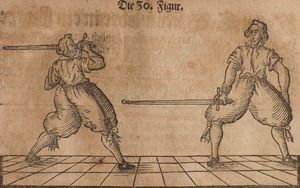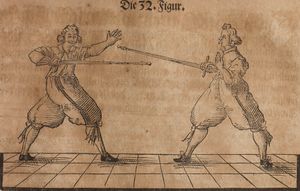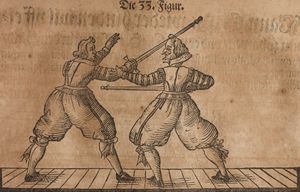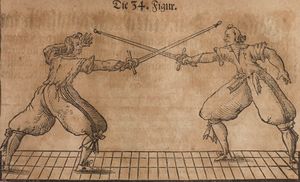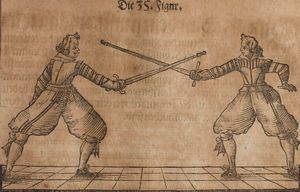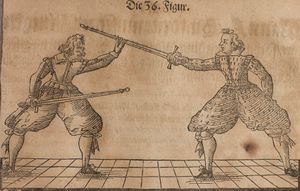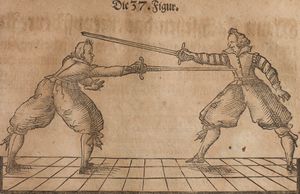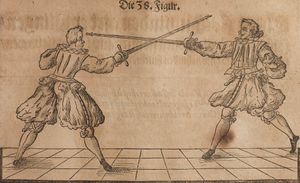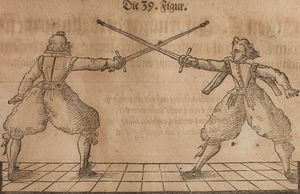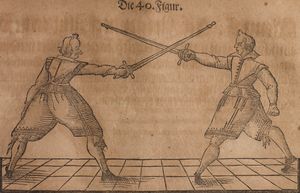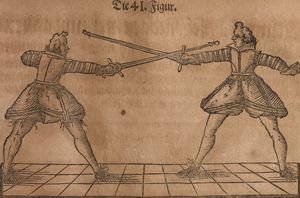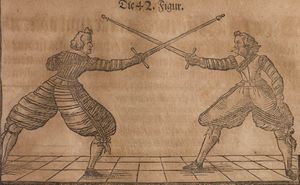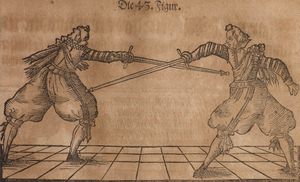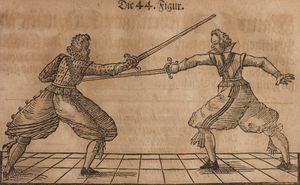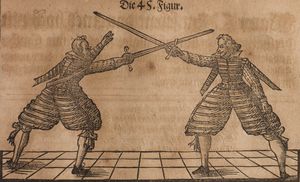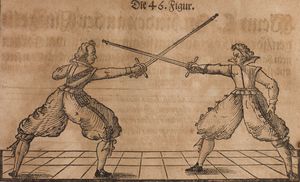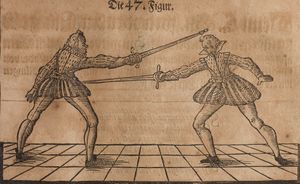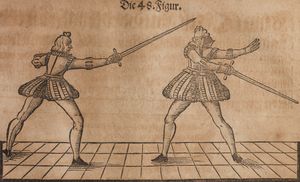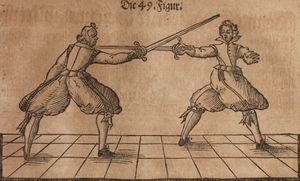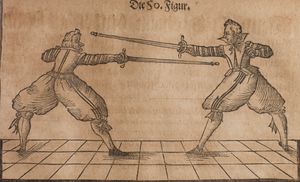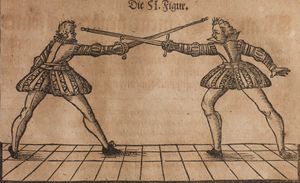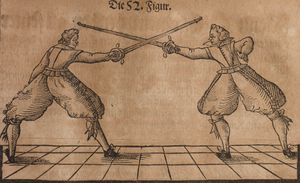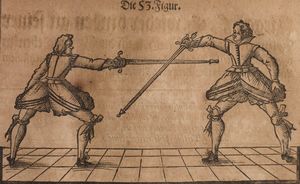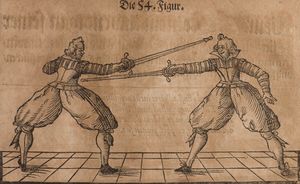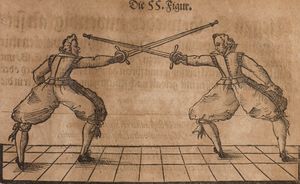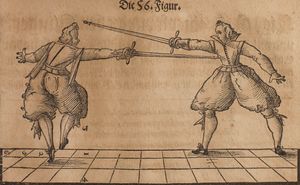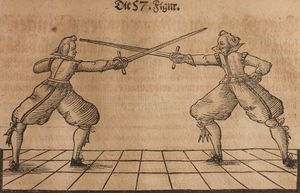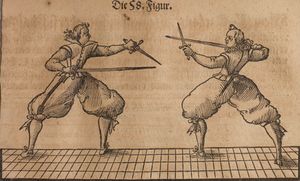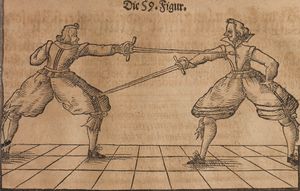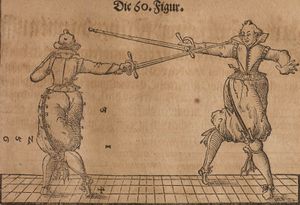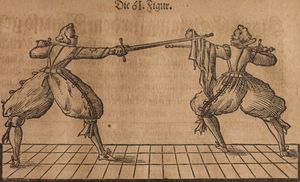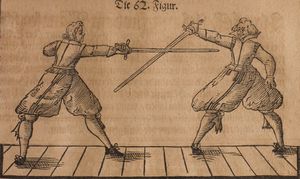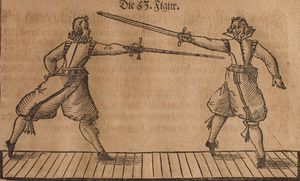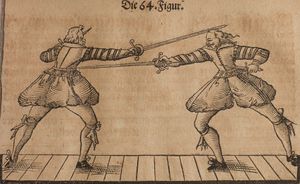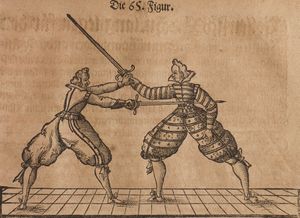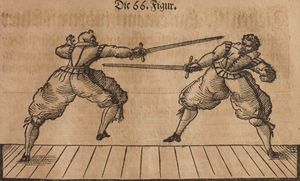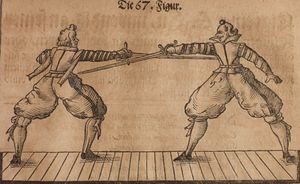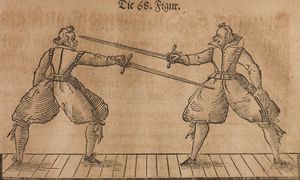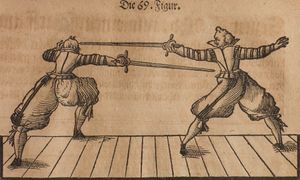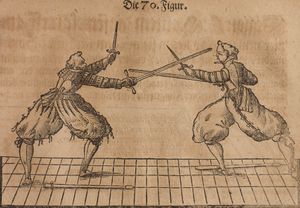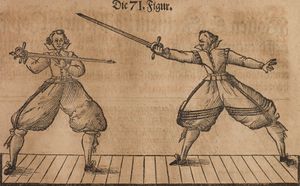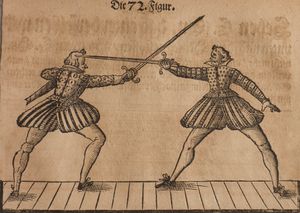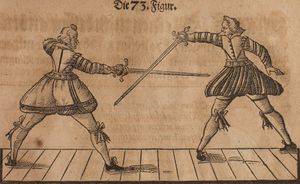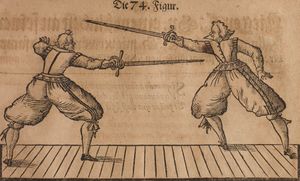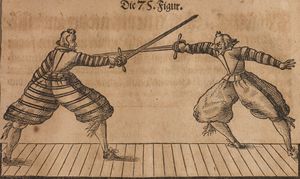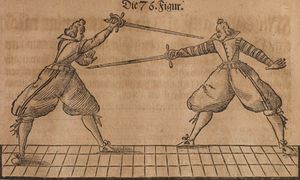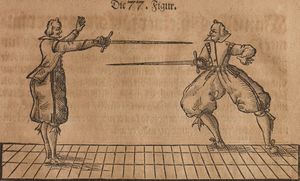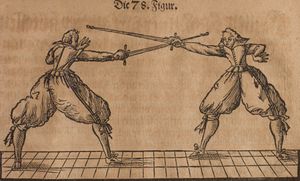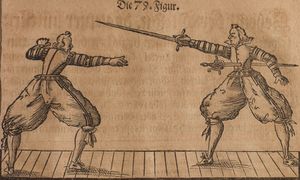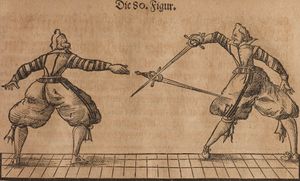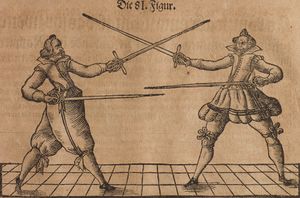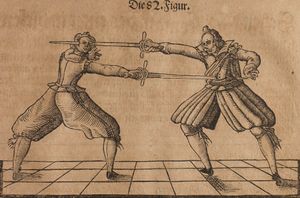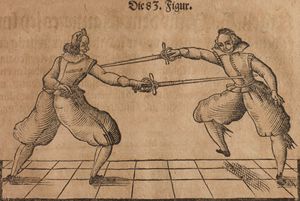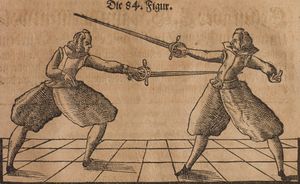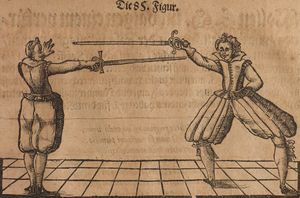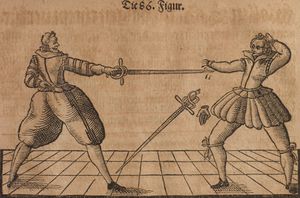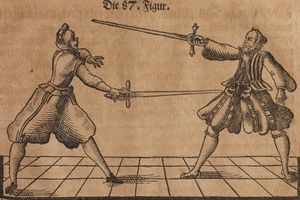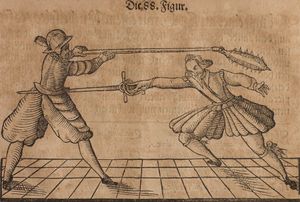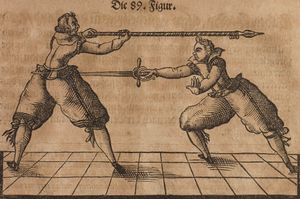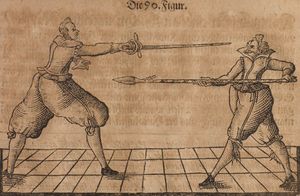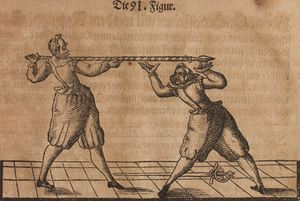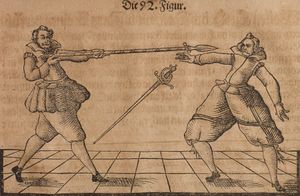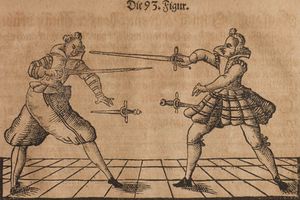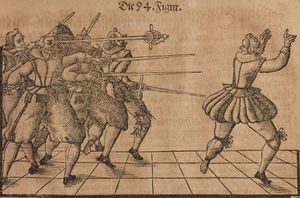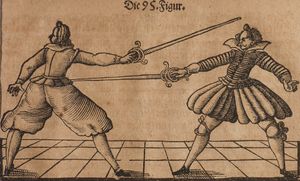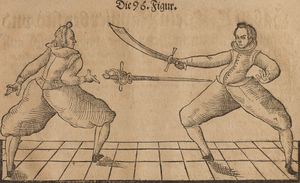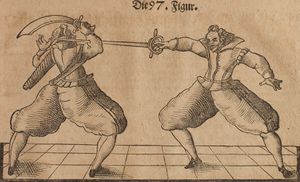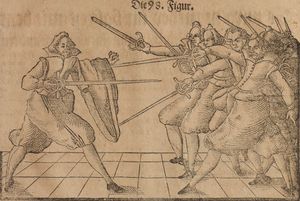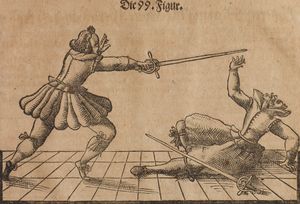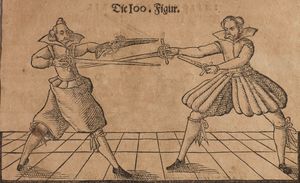|
|
You are not currently logged in. Are you accessing the unsecure (http) portal? Click here to switch to the secure portal. |
Michael Hundt
| Michael Hundt | |
|---|---|
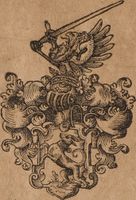 Arms of Michael Hundt | |
| Born | 16th century |
| Died | 17th century |
| Occupation | Fencing master |
| Movement | Freifechter |
| Influences |
|
| Influenced | Jakob Sutor von Baden |
| Genres | Fencing manual |
| Language | Early New High German |
| Notable work(s) | Ein new Kůnstliches Fechtbuch im Rappier |
| Concordance by | Michael Chidester |
Michael Hundt was a 17th century German fencing master. His inclusion of a griffon with a sword is arms may indicate affiliation with the Veiterfechter fencing guild.
In 1611, he authored a treatise on the use of the rapier entitled Ein new Kůnstliches Fechtbuch im Rappier ("A New Art-Filled Fencing Manual on Rapier"); this, along with Gründtliche Beschreibung der Kunst des Fechtens by Joachim Meyer, was one of the sources drawn upon by Jakob Sutor von Baden for his own treatise of 1612.
Contents
Treatise
Images |
||
|---|---|---|
Images |
Transcription Radovan Geist | |
|---|---|---|
| [No description] | ||
| 1. Firstly, your grace should be situated with outstretched arm, together with the blade, and turn well your grace to both sides where the enemy would like to come. | 1. Erstlichen sollen E. G. mit ausgerecktem langen Arm ligen⁄ samɮt der Klingen⁄ und wenden E. G. wol mit uff allen benden Seiten⁄ woder Feind herkomen moechte. | |
| 2. When your grace sees that one will cut in to your right arm, thus turn or set off well and step on to the tertzi or 3., and thrust back to his right side or to the head. It goes hereafter, your grace, from the tertzi in turn to the secunda or 2., and position yourself with the blade long before the opponent. | 2. Wann E.G. sehen⁄ das einer hinden neinhawen wil nach derselben rechten Arm⁄ so wenden oder versetzen Sie wol mit⁄ und tretten auff die Terzi oder 3⁄ und stoɮen hinden nach seiner rechten seiten⁄ oder nachm Kopffe zu. Es tretten hernach E. S. von der Terzi widerumb auff die Secunda oder 2⁄ und ligen lang mit der Klingen für den Mann. | |
| 3. When your grace sees that one will hack further in at your face, thus do not allow this to hit, but rather step well out to the tertzi or 3. and allow his cut to fail. Go presently again, your grace, also on to the secunda or 2. and position yourself again with outstretched arm long before the opponent. | 3. Wann E.G. sehen⁄ das einer fornenach derselben Gesicht wil einhawen⁄ so laɮen E.G. nich treffen⁄ sondern tretten die Terzi oder 3 wol mit⁄ un laɮen ihn fehlhawen. Es tretten E.G. bald wieder auch auff die Secunda oder 2 mit⁄ und ligen wieder mit ausgerecktem landen Arm für dem Mann. | |
| 4. When your grace will go at the opponent, then wrench away his blade forward on his weak, step back well on to the Quart or 4. and cut deep in to his face. You then come back again to the secunda or 2. how previously instructed. | 4. Wann E.G. zum Manne will zugehen⁄ so reiɮen sie seine Klinge fornen in der Schwäche hinweg⁄ tretten hinden auf die Quart oder 4 wil mit⁄ und hawen tieff nach seinem Gesichte hinein. Es tretten E.G. auch also bald wieder auff die Secunda oder 2 mit⁄ wie zuvorn gemeldet. | |
| 5. When your grace sees that one lies at the blade, and he will let his point go under and through to your grace's right side, then step your grace well out to the tertzi or 3. and fall with the point right up to his upper body or breast. If he sets this off, then step your grace with the left leg from the tertzi out to the secunda, and hew in to him further to his face. | 5. Wenn E.G. sehen⁄ das einer fornen an der KLingen ligt⁄ und er wil unten laɮen durchgehen mit der Spitze nach E.G. rechten Seiten⁄ So tretten E.G. auff die terzi oder 3 wol mit⁄ und fallen mit der Spitzen recht oben eein⁄ nach seinem obern Leib uder Brust zu. Verletzter aber das in demselbigen⁄ so tretten E.G. mit dem lincken Schenckel von der Tertzi uff die Secunda⁄ unnd hawen forne ihm nach seinem Gesichte nein. | |
| 6. When your grace is positioned back on his blade, then wrench his blade from under up high, and thrust in deep with the ascending hand to his left or short rubbed??, and quickly turn again the thrust, and cut in to him above at his face. | 6. Wann E.G. mit ihrer Klingen hinden an seiner Klinge ligen⁄ so reiɮen Sie seine Klinge von unten in der Höhe auff⁄ und stoɮen tieff mit verwanter hand nach seiner lincken oder kurtzen Rieben nein⁄ und kehren E.G. alɮbald wieder umb mit dem Stoɮ und hawen ihm oben nach seinem Gesichte wider hinein. | |
| 7. When your grace sees that one is positioned to the rear on the blade, and he will further go through to your grace's body or deceive, then step your grace only behind yourself out to the quarta or 4. and thrust right above to his body, and position yourself also quickly to this completed thrust with outstretched blade again right to his face. | 7. Wann E.G. sehen⁄ das ihr einer hinden an der Klingen ligt⁄ und er wil forne mit der Spitzen durchgehen nach E.G. Leibe zu⁄ oder verführen⁄ So tretten E.G. nur hinter sich uff die Quarta oder die 4 mit⁄ ind stoɮen recht oben nach seinem Leibe⁄ unnd ligen auch alɮbald nach gethanem Stoɮ mit auɮgerackter Klingen wieder recht nach seinem Gesicht zu. | |
| 8. When one will deceive your grace with this same blade, then, your grace, do not dupplieren more than 3 or 4 times, and hew back out to him or further in deep at him. Allow it, your grace, to run off well in your fist, and remain at him all the while, rightly forth at his face, when the strike is happening. | 8. Wann E.G. einen verführen will in deɮelben Klinge⁄ so dupplieren E.G. nich mehr als 3 oder 4 mal⁄ und hawen auff ihn hinden oder fornen fieff auff ihn zu. Es laɮen E.G. die Klinge in der Faust woll ablauffen⁄ und bleiben Ihme allezeit recht für dem Gesicht ligen⁄ wenn der Hieb geschehen ist. | |
| 9. Will your grace again dupplieren, then dupplieren likewise again only 3 or 4 times with this same, and pay attention, your grace, that you hasten your thrust back in or further to him. You must remain, your grace, not far from his blade though. | 9. Wenn E.G. wieder dupplieren⁄ so dupplieren sie gleichsfalls wieder drey oder vier mal in deɮelbigen Klinge⁄ und haben E.G: achtung⁄ das Sie ihn mit dem Stoww hinden oder forne nein uff ihn züile. Es bleiben aber E.G. mit ihrer Klinge nich weitleufftig von seiner Klingen. | |
| 10. When your grace sees that one will deceive on your grace's blade, then hew or thrust, your grace, deeply at him, and do not allow him to complete this, thus he cannot have it with his deception, however, then your grace can easily do harm to him, thus he comes to this from his own deception. | 10. Wenn E.G. sehen⁄ das Sie einer verführen will inn E.G: Klingen⁄ so hawen oder stoɮen E.G. tief auff ihn zu⁄ und laɮen ihn daɮelbe nicht vollbringen⁄ so tat er mit der verführung mit seiner Klingen E.G. nichts anhabe⁄ Jedoch das E.G. ihm dieselbe verführung leichtlich einen Ubbruch thun kan⁄ so kömpt er aus derselben verführung. | |
| 11. When your grace sees that one will cut back in at your head, then turn this about with your blade, and hew against him so that he cannot hit. | 11. Wenn E.G. sehen⁄ das einer nach ihrem Kopff will hinden nein hawen⁄ so kehren sie mit der Klingen umb⁄ und hawen ihm dargegen⁄ so kane r nicht treffen. | |
| 12. When your grace sees that one will hew back in to the right side or head, then hit well the blades together and go to the tertzi or 3. and thrust below his blade to his breast. It goes, your grace, also quickly back to the secunda or 2. how you then position yourself with the blade again and again before the opponent. | 12. Wann E.G. sehen⁄ das wider einer hinden will hawen⁄ nach der rechten seiten oder Kopff zu⁄ So tretten Sie sampt der Klingen auff die Terzi oder 3 woll mit⁄ und stoɮen unter seiner Klingen uff die Brust zu. Es tretten E.G. auch balde wieder uff die Secunda oder 2 mit⁄ wie sie dann je und je also ligen mit der Klingen für dem Mann. | |
| 13. When your grace sees that one hews further high to your face, then see at once when he will go with the blade to hew, then step back to the quart or 4. and hew in at the same time as him to his fist, when he hews high, also position yourself again straight with the blade. | 13. Wenn E.G. sehen das einer fornen hoch nach ihrem Gesicht hawen⁄ so sehen sie als bald wann er von der Klingen abgehen wil ud hawen⁄ so tretten sie hinden auff die Quart oder 4 und hawen zugleich mit ihm nach seiner Faust nein⁄ wann er hoch hawet⁄ es ligen E.G. auch gerade wider mit der Klingen. | |
| 14. When your grace sees that one will again hew high to the face, then pay attention that you thrust him to the fist or to the arm. | 14. Wenn E.G. sehen⁄ das einer wieder fornen nach dem gesicht hoch will nein hawen⁄ so haben sie achtung⁄ das sie ihme nach der Faust ider nach Arm stoɮen. | |
| 15. When your grace will take the strong of the rappier, then cut in with a good stretch on to the front of his blade, you hit however, your grace, with the cut at the same time, and hew in deep forward to his face, thus however should you step well in these cuts. | 15. Wann E.G. einem die strecke im Rappir nemen wil⁄ so hawen sie bey einer guten spannen forne uff seine Klinge nin⁄ Es treten aber E.G. mit dem haw zugleich mit⁄ und hawen tieff forne nach seinem Gesicht hinein⁄ so sollen aber die quart oder 4 wol mittretten in dem hawen. | |
| 16. When your grace sees that he will not allow it to hit and will allow his cuts to fail, then with this, then step well further to the tertzi or 3. and thrust in deep at him. You must step quickly again however, back to the secunda or 2. | 16. Wann E.G. sehen⁄ das er nicht leɮet treffen⁄ und wil laɮen fehl hawen⁄ so tretten sie auff die Terzi oder 3 fornen wol mit⁄ und stoɮen tieff hinden uff ihn zu⁄ Sie tretten aber bald wieder auff die Secunda oder 2. | |
| 17. When your grace will wind out the opponent's blade, thus position yourself with the blade forward to his blade and push his blade well under your blade, with this step well to the 3. and thrust deep in to the right side. Your grace must step quickly back from the 3. to the 2, and hew above to his face. | 17. Wann E.G. einem wil die Kling auswinden⁄ so ligen sie mit der Klingen fornen an seiner Klingen⁄ und drücken seine Klinge wol unter ihre Klinge⁄ tretten auf die 3 woll mit⁄ und stoɮen tieff auff die rechte Seite hinein. Es tretten E.G. alɮbald von der 3 wieder auff 2 hinder⁄ und hawen oben nach seinem Gesicht. | |
| 18. When your grace is positioned back on his blade, thus wind his blade under yours and step well from the secunda or 2. to the quarta or 4, and hew deep in to his face, and step quickly from the quarta to the 2. | 18. Wann E.G. hinden an eines Klingen ligt⁄ so winden Sie seine Klinge unter ihre Klinge⁄ und tretten von der Secunda oder 2 auff die Quarta offer 4 wol mit⁄ und hawen nach seinem Gesicht hinein⁄ und tretten alɮbald von der Quarta auff die 2. | |
| 19. When your grace sees that one will cut to your leg, then with this, step well to the quinta?? and run off with the blade, step quickly from the 5. to the 1. and hew again high thereafter. | 19. Wann E.G. sehen⁄ das einer nach irem Bein wil hawen⁄ so tretten sie auff die quinta wol mit⁄ und verfallen mit der der Klinge⁄ tretten alɮbald von der 5 uff die 1 und hawen wieder oben drauff. | |
| 20. When your grace sees that again one will cut to your legs, thus pull your leg away, allow your blade to run off well, and cut in to him at his head. | 20. Wenn E.G. sehen⁄ das widereiner nach ihren Bainen hawen wil⁄ so ziehen sie den Schenckel web⁄ laɮen mit der Klingen recht wol ablauffen⁄ und hawen ihm nach dem Kopf hinein. | |
| 21. When your grace sees that one is positioned forward on your blade, and will cut at your grace's calves, then step well to the 5, and set off also with this. Your grace must step quickly back to the first and cut in to the face, and always be positioned straight with the blade. | 21. Wann E.G. sehen⁄ das einer fornen an irer Klingen ligt⁄ un wil E.G. hinden nach der waden hawen⁄ so tretten sie auff die 5 wol mit⁄ und versetzte auch damit. Es tretten E.G. als bald wieder mit zu auff das erste⁄ und hawen nach dem Gesichte hinein⁄ und ligen allzeit gerade mit der Klingen. | |
| 22. When your grace sees that one will cut the same way, again to the calves, thus allow your blade to come well under his, step well and deep to the 3. and thrust in deep to his groin. You must remain at his body, turn the blade around and make as if you would cut him to the head, and with this turning around with the blade, your grace, again thrust him with the cross and pommel to the face, or do to him what you will. | 22. Wann E.G: sehen⁄ das einer derselben wieder nach den waden wil hawen⁄ so laɮen sie ihre Klinge wol unter seine kommen⁄ thretten fieff die 3 wol mit⁄ und stoɮen tieff nach seinem Gemächt hinein. Es bleiben E.G. ihm am Leibe⁄ kehrenn mit der Klingen auch umb⁄ und thun⁄ als wolten sie ihm nachm Kopff hawen. Es kehren E.G. wider mit der Klingen umb⁄ stoɮen ihm Kreutz und Knopff ins Gesicht⁄ oder was sie mit ihm wil aufangen. | |
| 23. When your grace sees that one is positioned rearward (at the back) on your blade, and will fail to go through further in with his point to your grace's body. Then proceed your grace, as if he will cut in with all his might, then step your grace with the left leg together with the parry inside to him, and hold your left hand over his blade, and jerk your rappier out from under his blade and thrust in to him to his whole body. | 23. Wann E.G. sehen⁄ das einer hinden an der Klingen ligt⁄ und wil nicht unterlaɮen durchzugehen mit seiner Spitze fornen nach E.G. Leib hinein. Sehen aber E.G. das er forne mit gantzer gewalt wil nein hawen⁄ so tretten E.G. mit dem lincken Schenckel sampt der versatzung auff ihn hinein⁄ und halten ihre lincke Hand uber seiner Klingen⁄ und ziehen ihr Rappier unter Klingen heraus⁄ unnd stoɮen ihm nachm gantzen Leibe hinein. | |
| 24. When your grace is positioned forward on his blade, then make as if you would nick at his face, and he takes this slice away, thus allow your grace's point to sink, and thrust him to his groin, or inwards to his middle. | 24. Wann E.G. forne an seiner Klingen ligt⁄ so thus sie⁄ als wolten sie ihme nachm Gesicht einschneiden⁄ nimt er den schnitt hinweg⁄ so laɮen E.G. die Spize sincken⁄ und stoɮen ihm nach seinem Gemecht⁄ oder in die mitte hinein. | |
| 25. When your grace sees that one will do this same face slice with a thrust to the groin, then step your grace, only back to the rear to the 5. and parry this same well, then step quickly back well thereafter to the 1. and thrust or hew in. | 25. Wenn E.G. sehen⁄ das einer daɮelbe ani hr wil oben mit dem Gesichtschneiden⁄ un stoɮen nach dem Gemächte⁄ so tretten E.G. nur hinden zurück auff die 5 und versezen daɮelbe wol mit⁄ tretten also bald wieder hernach uff das 1 wol mit⁄ und stoɮen oder hawen hinein. | |
| 26. When your grace himself, will lay in a Guard, thus position yourself right with the blade before the face, with a good distance from the earth, or to the earth, when the arm gets tired, then your grace can rest together with the blades, Then quickly now your grace will hew or thrust, then step your grace right and well to the tertzi and thrust in deep to his upper body. | 26. Wann E.G. sich wollen in ein Lager legen⁄ so ligen sie recht mit der Klingen vor dem Gesichte bey einer guten spannen von der Erden⁄ oder auff der Erden⁄ Wann der Arm müde wird⁄ so können E.G. sampt der Klingen ruhen⁄ So bald nun E.G. wil hawen oder stoɮen⁄ so tretten E.G. recht wol uff die Terzi⁄ und stoɮen tief nach seinem obern Leibe zu. | |
| 27. When your grace is positioned in a long guard, and the arm will become tired, lastly position yourself as was just instructed, also right before the face, so that your grace's point goes a little to his right side, and thus you think Your grace, that he would hastily go with a thrust to you, but he comes with a total thrust, then step your grace, to the 3 and thrust also back in to him, what he seeks. But if your graces does not want to do this, and you do not want to lag the thrust, thus step your grace only backwards to the 5. and parry his thrust, step again into a total thrust and cut, how the step goes. | 27. Wenn E.G. im landen lager gelegen ist⁄ und der Arm wil müde werden⁄ zulezt ligen E.G. wie jeztgemelt⁄ auch recht von der Gesichte⁄ daɮ E.G. spiz recht ein wening nach seiner rechten seiten gehet⁄ so denckt derselbe⁄ er wolle E.G. mit dem stoɮ ereilen uff E.G. zu⁄ kömpt er aber mit vollfömlichen stoɮ⁄ so tretten E.G: uff die 3 und stoɮen auch hinden uff ihn nein⁄ was er suchet. Wollens aber E.G. nich thun⁄ unnd wollen ihm den stoɮ nit nacheilen⁄ so tretten E.G. nur zurück uff die 5 und versezen seinen stich⁄ tretten wieder in vollkömlichen stich⁄ unnd hawen zu⁄ wie der Tritt gehet. | |
| 28. When your grace would use the leg cut, thus position your grace with the blade on his blade's forward, and in this same, make as if you would thrust in deep with the point. He takes this thrust away, then allow your grace's point to run off below to the right side, and cut in to his elbow or fist, turn the blade around quickly and cut back in to him. | 28. Wenn E.G. den Schlenckehr am brauchen wollen⁄ so ligen E.G. mit der Klingen an seiner Klingen fornen an⁄ in demselbigen thun E.G. als wolten sie mit der spitze tieff forn nein stoɮen. Nimt er den stoɮ weg⁄ so laɮen E.G. die Spiz an der rechten seiten von unten ablaufen⁄ und hawen nach seinnem Ellgogen oder Faust hinein⁄ keren alɮbald umb mit der Klingen⁄ und hawen hinden nein auff ihn. | |
| 29. Would your grace cut at one to the elbow, then wrench or batter EG, his blade away, and step to the tertzi, and cut deep in to the elbow. It is done EG quickly from the 3 to the 2, and then position yourself again with outstretched arm. | 29. Wollen E.G. einem nach dem Ellenbogen hawen⁄ so reiɮen oder schlagen E.G. ihm seine Klinge hinden weg⁄ und tretten uff die Terzi⁄ unnd hawen tieff nach dem Ellbogen hinein. Es fallen E.G. von der 3 alɮbald uff die 2 mit⁄ und ligen wieder mit auɮgerecktem Arm. | |
| 30. When your grace sees that further, one cuts deep at your face, thus pay attention EG, when he will cut , then jerk away immediately EG the blade together with the body, and step with this to the quint or 5. To this same however follow EG afterwards with the left leg and overhand, and use the Landsknecht cut. | 30. Wenn E.G. sehen⁄ das einer tieff forne nach ihrem Gesicht hawen⁄ so haben E.G. achtung⁄ Alsbald wenn er hawen wil⁄ So ziehen E.G. die Klingen sampt mit dem leib hinweg⁄ und tretten mit uff die quint oder 5. Zu denselben aber folgen E.G. hernach mit dem lincken Schenckel und Oberhandt⁄ und brauchen den Landɮknecht haw. | |
| 31. Would your grace himself, again be positioned in a guard, thus lay EG with the blade right high, with the ascended hand right before the face which is known as the Spanish Guard and give no openings with the body. It goes however EG that one will cut or thrust to the lower body, or to the middle, then thrust EG deep in to him, how the step goes, in 5 thrust, it is to whichever side, where your grace will be driven to remain in the circle. | 31. Wollen E.G. sich wieder in ein Lager legen⁄ so legen E.G. sich mit der Klingen recht hoch⁄ mit der verwandten Hand recht vor dem Gesichte im Spanischen Lager genandt⁄ und geben E.G. den Leib nich bloɮ mit dem Lager. Sehen aber E.G. daɮ einer hawen wil ober stoɮen nach dem untern Leib⁄ uden in die mitte⁄ so stoɮen E.G. tieff auff ihn zu⁄ wie der Tritt gehet⁄ un 5 Stich⁄ es sey uff welcher seiten⁄ da E.G. getrieben wird in dem Zirckel zu bleiben. | |
| 32. The fourth guard: would your grace give an opening with the body, thus will he thrust or cut at your grace. If he thrusts then, so take his thrust away, and step to the quart or 4. and thrust in with ascending hand to his neck, and fall EG with the blade from the quart or 4. immediately to the secunda or 2., and position yourself again in a good parrying. | 32. Das vierdte Lager: wollen sich E.G. mit dem Leib bloɮ geben⁄ so wird er nach E.G. stoɮen oder hawen. Stöst er dann⁄ so nemen E.G. ihm den stoɮ hinweg⁄ und treten uff die quart oder 4 und stoɮen mit werwanter handt nach seinem Halz hinein⁄ und fallen E.G. mit der Klingen von der quart oder 4 als bald uff die secund oder 2 mit⁄ unnd liegen wieder in guter varfaɮung. | |
| 33. When your grace sees that one will run in, it is with a cut to the back or front (of your blade), again, when one also is positioned on the rear of your blade, and will go through, and thrust forward to the body, likewise when he also is positioned forward on your blade, and will allow the blade to go through, back and in to you, with a thrust, then step well EG only behind you to the 5., when he will run in to these 4 points, then he runs into your point. Step EG with the left leg from the 2. to the 6, then position EG right around again before the opponent. | 33. Wenn E:G: sehen⁄ das einer E.G. wil einlaffen⁄ es sey im haw hinden oder fornen⁄ Wiederumb⁄ wann einer auch hinder an der Jlingen ligt⁄ und wildurchgehen⁄ und forn stoɮen⁄ nach dem Leib⁄ deɮgleichen wenn er auch vorn and der Klingen ligt⁄ unnd wil mit der Spizen hinden lauffen durchgehen und stoɮen⁄ so tretten E.G. nur hinter sich uff die 5 wol mit⁄ Wann er diesen vier Puncten wil einlauffen⁄ so leuffet er sich selbst in die Spizen. Es tretten E.G. mit dem lincken Schenckel von der 2 uf die 6 so ligen E.G. recht widerumb von dem Mann. | |
| 34. When your grace will again cut in back to one, and he will come in to the cut, thus make EG as if you would cut in at him with all your might, and go with the point under and through, and step to the 5. when he follows after, then he runs into your point. | 34. Wann E.G. wider hinden will uff einen zuhawen⁄ und er wil E.G. einfallen in den Haw⁄ so thun E.G. als wolten sie mit ganzen gewalt uff in zuhawen⁄ und gehen mit der Spizen unten durch⁄ und tretten uff die 5wenn er nachfolget⁄ so leufft er selbst in die Spizen. | |
| 35. Would your grace make one tired in fencing or brawling, thus position yourself to all and both sides on the blade, and push his blade down low, it goes for cuts or in going through. Your grace may also injure him very well, when he cuts, or lets it go through from under, when your grace does not use the pushing on the blade. | 35. Wollen E.G. n. einen müde machen im fechten oder im balgen⁄ so liegen sie auff allen beyden seiten an der Klingen⁄ und drücken ihm seine Klinge darnieder⁄ es sey im hawen oder im durchgehen. Es künnen E.G. ihm auch gar wol einen abbruch thun⁄ wann er hawet⁄ oder lest unten durchgehen⁄ wann E.G. das drucken an der Klingen nich brauchen wil. | |
| 36. When your grace is positioned in the fifth guard, thus position yourself correctly your grace with the blade on the body, and step with your right leg out to the 5. and remain standing with the left leg on the 2. as soon as one will cut deep at your grace, then step forth with the displacing to the prima, and cut in to his face, or rather, your grace can wrench well his blade to the ground, however, additionally your grace shall refrain from the opportunity, though of the many antics or tricks in the guards that are used. | 36. Wann E.G. in dem fünfften Lager ligen wil so ligen E.G. recht mit der Klingen an dem Leibe⁄ und tretten mit dem rechten Schenckel uff die 5 unnd blieeben mit dem lincken Schenckel uff der 2 stehen. So bald als einer tieff uff E.G. wil hawen⁄ so tretten sie mit der versazung fort auff die Prima mit⁄ unnd hawen ihm nach seinem Gesichte nein⁄ Oder aber⁄ E.G. kan ihn wol mit seiner Klingen zu boden reiɮen⁄ So fern aber E.G. die gelegenheit werden absehen⁄ jedoch⁄ das viel Poɮen in dem Lager zugebrauchen sind. | |
| 37. When Your grace is positioned forward on his blade, thus do this thing, as if your Grace would cut to his hand, but immediately turn the point around, and use an ascending thrust to him, Your grace. | 37. Wann E.Gn. forne an seiner Klingen ligt⁄ so thun sie ein ding⁄ als wolten E.G. ihm nach seiner Faust hawen⁄ fehren alɮbald mit der Spizen umb⁄ unnd brauchen E.G. einen gewandten stoɮ auff ihn. | |
| 38. When your grace sees that one will attack to your right side, it goes for the cuts and the thrusts, or in the deceiving, thus your grace must follow to, on the same point where he looks for something, thus you do the same to him at the same time. If he attacks forth at your grace, then attack with the same also forth to him, it goes for the cuts or the thrusts. | 38. Wenn E.G. sehen⁄ das einer uff der rechten seiten E.G. wil angreiffen⁄ es sey im hawen⁄ im stoɮen⁄ oder in der verführung⁄ so folgen E.G. auch an demselbigen Ort nach⁄ wo er etwas suchen wil⁄ so thun sie daɮelve im gleichen. Greifft er E.G. forne an⁄ so greiffen dieselbe ihn auch forne an⁄ es sey im hawen oder im stoɮen. | |
| 39. If your grace is positioned back on the blade, then make as if your grace would cut with all your might, but, turn that around and cut in back at him. | 39. Liegen E.Gn. hinden an der Klingen⁄ so thus E.G. als wolten sie mit ganzer gewalt hawen⁄ kehren umb⁄ und hawen hinden hinein. | |
| 40. If your grace is positioned forward on his blade, then make as if you would cut in at him with all your might, but also turn that around and cut forth at his face. | 40. Ligen E.G. forne an der Klingen⁄ so thus E.G. als wolten sie mit ganzem gewalt hinden nein hawen⁄ kehren auch bald umb⁄ und hawen forn nach seim Gesicht. | |
| 41. When your grace will cut in deep at one forward to the face, and he will also quickly run in with his blade at your grace, then step well to the quint or 5. and take the rappier in both fists, and thrust deep at him, see how he quickly cedes, thus he stays well away from Your grace, that he cannot well use the running in. | 41. Wenn E.G. auff einen tief werden hinein hawen forne nach dem Gesichte⁄ und er wil mit der Klingen also bald eirnlauffen auff E.G. zu⁄ So treten sie uff die quint oder 5 wol mit⁄ und nemen das Rappier zu beyden fäusten⁄ und stoɮen tieff auff ihn zu⁄ wie der erste geget im abtritt⁄ So bleibt er wol von E.G. honweg⁄ das ser den Einlauff nicht wol brauchen kan. | |
| 42. When your grace sees that one will cut forth to the face without careful attention, then go only with the point under and through, thus he cannot come to the face. However your grace may thrust to his face every time, or you may further cut in deep to him, and also at once position yourself straight before the opponent. | 42. Wenn E..G. sehen⁄ das einer zum achten mal wil forne nach dem Gesicht hawen⁄ so gehe sie nur mit der spiz von unten durch⁄ so kane r zum Gesichte nicht kommen. Aber E.G. können ihn allzeit forn nach dem Gesicht stoɮen⁄ oder zu ihn forn tieff nein hawen⁄ und auch also bald mit der Klinge gerade vor dem Mane liegen. | |
| 43. When your grace sees that one will thrust from under to your groin, then do this thing, thrust him, before he has spent his impact, so that, however, your grace's blade is first in thrusting. | 43. Wenn E.G. sehen⁄ das einer wil von unten stoɮen nach dem Gemecht zu⁄ so thun sie in ding⁄ und stoɮen drein⁄ ehe er den stoɮ verbringe⁄ Das aber E.G. kling die erste sey im stoɮen unter seiner Klingen. | |
| 44. When your grace sees that one will always cut back in at your right arm, then your grace must thrust in under his blade, with the relative fist, then must he stop with the cut. | 44. Wenn E.G. sehen⁄ das einer wil hinden immer nein hawen nach dem rechten Arm⁄ so stoɮen E.G. mit verwandten Faust unter seiner Klinge hinein⁄ so mus ser innehalten mit dem haw. | |
| 45. When your grace sees that you are positioned forth with your blade on his blade, then make as if your grace would thrust or cut with the point to his face, if he takes the thrust or cut away, then allow the point to fall and then thrust him to his groin. | 45. Wann E.Gn. sehen⁄ das E.G. mit der Klingen forn an seiner Klingen ligen⁄ so thus E.G. als wolten sie mit der Spizen nach seinem Gesichte stoɮen oder hawen. Nimt er den Stoɮ oder Haw weg⁄ so laɮen sie Spize fallenn⁄ und stoɮen ihm nach sienem Gemächte zu. | |
| 46. When your grace sees that one is positioned high with the blade, then make as if you would cut back in with all your might, with this however, go through under his blade, when you see that he will displace your cut, and then thrust him right forth to his breast. | 46. Wann E.Gn. sehen⁄ das einer hoch mit der Klingen ligt⁄ so thus sie⁄ als wolten sie mit ganzer gewalt hinden nein hawen⁄ In demselben aber wenn er denn haw versezen wil⁄ sogehen E.G. sampt der Klingen unter seiner Klingen durch⁄ unnd stoɮen ihn recht forne uff die Brust. | |
| 47. When your grace is positioned back on the blade, then make as if you would strike forth with all your might, but in this cut, however, step well with the right leg forward and thrust in to his lower body. | 47. Wenn E.Gn. hinden ann der Klinge ligen⁄ so thus sie⁄ als wolten sie mit ganzer gewalt fornen nein hawen⁄ Im haw aber so tretten E.G. wol mit dem rechten Bein fort⁄ und stoɮen ihm nach seinem untern Leib hinein. | |
| 48. When your grace is positioned either forward or back on the blade, then your grace must go together with the entire arm and the blade, and cut him to his elbow, or from under to his face, you may always position yourself before the man this way, again and again. | 48. Wenn E.Gn. forn oder hinden an der Klingen ligt⁄ so gehen E.Gn. mit dem ganzen Arm auff sampt der Klingen⁄ und hawen ihm nach seinem Ellnbogen⁄ oder von unten nach senem Gesicht zu⁄ Es Können E.G. allzeit mit der Klingen wieder von dem Mann ligen je und je. | |
| 49. When your grace sees that one will thrust forth to your breast, or to the heart, thus take heed, that, as soon as he is in the thrust, that you step well only back to the quart or 4. and then thrust him at the same time, thus you step before he does. If your grace thinks he is reachable, and especially when he is positioned back on your blade, and will further go through and under, then take careful heed with this. | 49. Wenn E.G. sehen⁄ das einer nach irem Leib wil stoɮen forne nach der Brust⁄ oder nach den Herzgruben zu. So haben E.G. achtung⁄ daɮ⁄ so balde er im stoɮen ist⁄ so tretten E.G. nicht mehr als hinden uff die quart oder 4 wol mit⁄ und stoɮen mit ihm zugleich⁄ so treffen sie ehe als er. Gedencket E.G. zu erlanden⁄ und sonderlich wenn aer hinden an der Klingen liegt⁄ und wil fornen mit der Spizen unten durchgehen⁄ so habe man achtung drauff. | |
| 50. When your grace sees that one will thrust in deep at your lower body, how it is currently the general practice. Then your grace must step no more than backwards, but well to the quint or 5. thus he cannot complete it. Your grace may also step well to the terzt or 3. and he runs in, however when you don't want to do this, thus can your grace again step back to the quint or 5 as before, and again with the outstretched arm be positioned before the opponent. But for all that, your grace may stop him with this stück very well, it goes for running in or in stepping. | 50. Wenn E.G. sehen⁄ das einer wil tieff nach ihrem Unterleib stoɮen⁄ wie iɮt der gemeine gebraucht ist. So treten E.G. nicht mehr als hinden wol uff die quint oder 5 mit⁄ so kan E.G. er nichts thun. Es könnnen E.G. uff die terz oder 3 wol tretten⁄ und ihm einlauffen⁄ wann sie es aber nicht thun wollen⁄ so können E.G. von der quint oder 5 wieder uff das eins tretten⁄ und wieder mit auɮgerecktem Arm von dem Manne liegen. Aber können E.G. ihme in diesem stück gar wol abbrechen⁄ es sey im Einfauff oder im tretten. | |
| 51. When your grace is positioned on the rear of his blade, then turn your blade around and cut with all your might forward to his face. There... be a little quiet with the cut, and allow that afterwards thus the point to sink, and thrust in forth to him, to his entire body. | 51. Wenn E.G. einem hinden an seiner klingen liegen⁄ so kehren sie mit ihrer Klingen umb⁄ und hawen mit ganzen gewalt forne nach seinem Gesicht zu. Es liegen E.G. ein wening un hawen stille⁄ und laɮen darnach also bald die Spizen sincken⁄ und stoɮen ihm forne nach seinem ganzen Leibe hinein. | |
| 52. When one is positioned inwards on your grace's blade, and thinks to cut in to your head or to your right side, then do this thing your grace; as soon as he is cutting, then thrust him quickly under his blade to his throat or neck, and be positioned again straight before the opponent with your blade. | 52. Wenn E.G. einer inwendig an ihrer Klingen ligt⁄ und gedenckt E.G. nach ihrem Kopff oder nach der rechten Seiten nein zuhawen⁄ So thun E.G. ein ding⁄ so balde er im hawen ist⁄ so stoɮen E.G. drein⁄ unter seiner Klingen nach seiner Gurgel⁄ oder Halse geschwinde zu⁄ und liegen gerade wieder mit ihrer Klingen von der Mann. | |
| 53. When your grace is positioned to the rear of one's blade, and he will go through and under your blade, to thrust with all his might, then do only this thing your grace; wind out his thrust, and step with your left leg to the 3, thus your grace can thrust him to his body. If he takes this thrust away, thus can your grace reverse from under, and cut in to his head, or you may with your right hand, wrench away his blade, together with his arm, or thrust your cross and pommel in to his face. | 53. Wenn E.G. einem hinden an seiner Klinge liegen⁄ und er wil nit ganzer gewalt unter E.G. Klingen durchgehen⁄ und derselben forne nach ihrem ganzen Leib zustoɮen⁄ so thun E.Gn. nun ein ding⁄ und wenden seinem stoɮ aus⁄ unnd tretten mit ihrem lincken Schenckel uff die 3 wol mit⁄ so können E.G. ihm nach seinem Leib stoɮen⁄ nimt er den stoɮ web⁄ so können E.G. mit ihrer klingen unbkehren von unten⁄ und hawen ihm nach seinem Kopff hinein⁄ oder könnnen mit ihrer rechten Hand seine Klinge Wegreiɮen sampt seinem Arm⁄ oder stoɮen ihm Kreuz und Knopf ins Gesicht hinein. | |
| 54. If your grace once again is positioned to the rear on his blade, thus go through, and even with this further going through, allow the point to fall, then thrust him into his body, and step to the tertzi of 3. | 54. Liegen E.G. wieder hinden an seiner Klingen⁄ so gehen E.G. auch durch⁄ unnd eben im durchgehen forne⁄ laɮen sie die Spizen fallen⁄ und stoɮen ihn nach seinem Leibe nein⁄ und tretten sie Terz oder 3 wol mit. | |
| 55. When your grace is positioned inwards on the opponent's blade, thus make as if you would beckon (or wave) to his face, just then, in this beckoning, allow your point to sink, then fall on him with the thrust, rightly to his body. | 55. Wenn E.G. einem inwendig in seiner Klingen ligen⁄ so thun E.G. als wolten sie ihm wincken nach seinem Gesichte⁄ Eben im wincken laɮen E.G. ihre spize sincken⁄ und fallen ihm recht nach seinem Leibe mit dem stoɮ zu. | |
| 56. If your grace is positioned again inwards on his blade, then do this thing: beckon with your point to his face, just then with this thrust, step forth together with your grace's left leg and your entire body to the tertzi or 3. and thrust with power to his entire body, or in to the middle. | 56. Liegen E.G. wieder inwending an seiner Klingen⁄ so thun E.G. ein ding⁄ und wincken mit ihrer Spizen nach seinem Gesichte zu⁄ Eben im stoɮ⁄ so tretten E.G. mit tem lincken Schenckel fort sampt mit ihrem ganzen Leibe auff die Terz oder 3 wol mit⁄ und stoɮen mit gewalt nach seinem ganzen Leibe⁄ oder in die MItte zu. | |
| 57. If one is positioned forward on your blade and will beckon at your face, thus pay careful heed to his thrust, then in this same thrust, take out his thrust with your cross's strong, before your face, and dash quickly in to him, take your whole body well in with this thrust. | 57. Ligh E.G. einer forne an der Klingen⁄ und wil E.Gn. nach ihrem Gesichte wincken⁄ so haben E.Gn. wol achtung auff den stoɮ⁄ Eben in demselben stoɮ so nemen E. Gn. Mit ihrem Kreuz mit der stercke seinem stoɮ auff vor ihrem Angesicht⁄ unnd rennen geschwinde auff in nein⁄ und nemen E.G. iren leib wol mit im stoɮ. | |
| 58. If your grace is or would be situated to fence with one, with the Dagger, thus pay careful heed to the opponent, and set forth half of the body, with the right leg together with the dagger and rappier, as soon as he will thrust your grace, then take his thrust well away with your dagger, and step with the leg, to the prima, thrust him to his head, and then with the thrust allow the point of your rappier to sink, and thrust him from under to his shorter ribs, so that he cannot displace this with his dagger. If your grace would not thrust after, then step with the left leg to the rear, well to the quinta, and take away all his thrusts with the dagger, if you see that he can be reached. However, your grace may well attack him with the Circle at your opportunity. | 58. Ligen oder wollen E.Gn. mit einem im Tolch fechten⁄ so geben E.G. wol achtung auff die Wiederpart⁄ und sezen E.G. mit dem rechten Schenckel sampt dem Tolch und Rappier fort mit dem halben Leibe⁄ So bal der uff E.G. wil stoɮen⁄ so nemen E.Gn. seinen stoɮ mit dem Tolch wol weg⁄ unnd tretten mit tem Schenckel uff die Prima⁄ und stoɮen ihm nach seinem Kopffe zu⁄ und eben im stoɮ laɮen E.Gn die spize sincken am Rappier⁄ und stoɮen ihn unten nach seinen kurzen Ribben hinten⁄ das ser es mit dem Tolch nicht versezen kan. Wollen E.G. nich nach stoɮen⁄ so tretten sie mit dem lincken Schenckel hinder sich wol mit auff die Quinta⁄ und demen alle stöɮe mit dem Tolch weg⁄biɮ E.G. sehen⁄ daɮ sie ihn erlangen können⁄ Aber E.G. können ihn im Circkel wol angreiffen nach ihrer gelegeuheit. | |
| 59. When your grace will fence or brawl long with one, and gives to you no openings before his face, and allows his point to sink, then will he thrust to your grace's knee or cut to your legs, or rather to your grace's body, Then fall upwards at once, with a thrust to his breast or in to his body, so that You come before, as he is below, and take careful heed of the steps, Your grace. | 59. Wenn E. Gn. Lang mit einem fechten oder sich balgen wolten⁄ so geben sich E.G. mit der Klingen mich bloɮ für sein Gesichte⁄ lest er seine Spize sincken⁄ und will nach E.G. Knie stoɮen⁄ oder nach sen beinen hawen⁄ oder sonsteu an E.G. Leibe etwas suchen⁄ So fallen E.Gn. oben also bald mit einem stoɮ nach seiner Brust oder nachm Leibe hinein⁄ daɮ E.G. eher komen⁄ als er unten⁄ und nemen D.G. die tritte wol acht. | |
| 60. If one is positioned to the rear of your grace's blade, and will further thrust high with his point to your grace's face, then give careful consideration to his thrust, and if he is in the process of completing his thrust, then step your grace to the quarta, thus your grace must step before he does. | 60. Light einer mit seiner Klinge hionden an E.Gn. Klingen⁄ und wil forne mit seiner spiczen hoch nach E.G. gesichte stoɮen⁄ so geben E.G. wol achtung auff seinen Stoɮ⁄ Ist er in vollkömlichen stoɮ⁄ so tretten E.G. die quarta⁄ so treffen sie eher als er. | |
| 61. If one comes before your grace, and there he will cut or thrust, especially at the Universities, where one goes to the tables or from the tables, how it is then the opportunity is occasionally given, that you come between one. Then wind over or throw your cloak around your left arm, and take out his cut, step when cutting to him, and thrust or cut again to him, and give yourself at all times a displacement until the enemy is overcome. | 61. Kömmen E.Gn. einer für⁄ der da wil auff E.G. zuhawen oder stoɮen⁄ und sonderlich auff Universiteten⁄ wenn man zu Tische oder von Tische heger⁄ wie es dann biɮwielen die gelegenheit giebt⁄ daɮ ihrer zwene uber einen kommen. So oberwinder oder schlagen E.G. ihren Mantel umb den lincken Arm⁄ und nemen seinen daw auff⁄ treten im hawen auff ihn⁄ unnd stoɮen E.G. oder hawen wieder auff ihn zu⁄ und geben sich jederzeit aus kemer versaɮung nicht⁄ biɮ so lange der Feind uberwunden ist. | |
| 62. If your grace is positioned long before the opponent, thus give careful heed, further to his blade, even when your grace is positioned to the rear on his rappier, thus push his blade further down low with a stretch, and thrust him forth to his breast. However, if he steps back with his right leg, then your grace must always follow with the strong there after, until you see, that you can break away from him with opportunity. | 62. Ligen E.G. land fur dem man⁄ so geben E.Gn. wol achtung forn auff siene Klinge⁄ eben wann E.Gn. hinden an seiner Klinge ligen⁄ so drücken E.G. siene Klinge forne bey seiner spannen darnieder⁄ und stoɮen ihm forn nach seiner Brust zu. Tritt er aber zurück mit seinem rechten Schenckel⁄ so folgen E.G. immer mit der stärcke hernach⁄ biɮ sie sehen⁄ daɮ sie ihm mit gelegenheit könen abbrechenn. | |
| 63. If your grace has the desire to fence with one, so do not give out from the triangle and the circle. If one however will tempt your grace, and to every point of your body try to attack, thus have diligent attention to your body, if it goes however, Your grace, that he has the desire to step further to you, then allow him to approach a little, however, not too close. Just then in the going through, your grace must step back to the quarta, and thrust him with the ascending hand, high to his face. You may, in this high thrusting allow your point to fall, and then thrust in to his middle, your grace must fall again with the right leg to the secunda, and position yourself again with the blade straight before the opponent. | 63. Haben E.Gn. lust mit einem zufechten⁄ So geben sich E.G. nicht aus dem Triangul⁄ und den Circkel. Ist aber einer⁄ der E.G. wil versuchen⁄ und an allen orten des Leibes angreiffen⁄ So haben E.Gn. fleiɮig achtung auff ihren Leib⁄ Sehen aber E.G. daɮ er lust hat forne zu treffen⁄ So laɮen E.G. ein wenig ankommen⁄ jedoch mich zu nahe. Eben im durchgenehn⁄ treten E.G. hinden auff die quarta⁄ und stoɮen ihn mit vewanter hand hoch nach seinem Gesichte zu. Es können aber E.G. im hochstoɮen ihre spize fallen laɮen⁄ unnd stoɮen ihm nach seiner mitten hinein⁄ Es fallen E.G. wieder mit dem rechten Schenckel auff die secunda zu⁄ und liegen wieder gerade mit der Klingen für den Mann. | |
| 64. When the two of you are fiercely against each other, and no one wants to give anything to the other, and one to the other means to be earnest, and each other fights for life and limb, but so is the one for the other with a clear intent to provide diligence to his enemy, until he can be powerful with his opportunity. Then where you between with each other will thrust at the same time, so no one has any art there, and the fame is on both sides, one is so clever that they wanted, and, forgetting the magnificent steps, does so more than a thrust, thereon it is most opportune. But that one will need the dagger on his person, yet he can come to more harm than it does him profit, especially when he has learned nothing of it. Thus is my advice, that one uses caution, and does not forget the steps, then will one have the Praise over his enemy. | 64. Wenn ihr zween auff einander erbittert seyn⁄ und will keiner dem anderen nichts nachgeben⁄ und einer den anderen mit erst meynen⁄ einander nach leib und leben stehen⁄ so sol doch den eine für dem andern mit guten bedacht sich fleiɮig vorsehen für seinem Feind⁄ bis ser mit gelegenheit seiner kan mechtig seyn. Dann wo ihr zween mit einander zugleich stoɮen⁄ so hat keiner Kunst bey sich⁄ und ist der ruhm auff beyden seiten aus⁄ man sey also klug man wolle⁄ und vergiɮet darbey die herrlichen Tritte⁄ so mehr tun als ein Stoɮ⁄ daran viel gelegen ist. Aber daɮ es einer auffm Tolch an seinem Leibe brauchen wil⁄ kane r mehr dardurch zu schaden kommen⁄ dals daɮ es ihm frommet⁄ und sinderlich⁄ wenn er nichts daraus agelrnet hat⁄ Als ist mein rath⁄ man brauchte vorsichtigkeit⁄ und vergeɮe ja der Tritte nicht⁄ so wird man das Lob haben für dem Fiende. | |
| 65. If your grace sees that one will dash in further with great power to your face, and especially when he thrusts high to your head, thus give careful consideration to his thrust, and hold your left hand not too far from your breast, and just then when he thrusts, see that your grace shoves away the thrust together with both his blade and arm, then step forth slightly with the right leg and thrust him through and through, yet he may well know, what it means, and he then sets the rappier to your body, thus you do may not want to use the thrust. | 65. Sehen E.G. daɮ einer mit ganzer gewalt forne auff E.Gn. wil hineinn rennen nach derselben Gesicht zu⁄ und sonderlich⁄ wann er hoch nach E.G. Kopff stoɮen wil⁄ So geben E.G. fleiɮig achtung auff seinen stoɮ⁄ und halten die kincke Hand micht wit von der Brust⁄ Eben in seinem stoɮ⁄ sehen E.G. daɮ si eden stoɮ sampt der Kling und Armen wegschlagen⁄ und treten ein wenig mit dem rechten Schenckel fort⁄ und stoɮen ihn durch und durch⁄ Es können ihm aber E.G. auch wol weisen⁄ wie ihn das Rappier nur auff den Leib sezen⁄ so sie sen Stich nicht brauchen wollen. | |
| 66. If your grace wants to be positioned long before the opponent, then do not allow yourself to bind on to his blade, and he goes through under with his blade, and will thrust to your grace's body, then remain forever with the point forth at his face, thus he cannot step well low with the thrust, however, your grace can well take away his thrust, or wind the same out with your blade, still that you take great care of your face, and allow yourself to not be deceived by his blade, but rather always hold and resist him. | 66. Wollen sich E.Gn. land legen für den Mann⁄ so laɮen E.Gn. nich anbinden an die Klingen⁄ Gehet er unten mit der Klingen durch⁄ und wil nach E.G. Leibe stoɮe⁄ so bleiben E.G. mit der spiz immerdar für seiner Gesichte⁄ so kan er nit wol unten treffen mit dem stoɮ⁄ Aber E.G. können ihm wol den stoɮ wegnemen⁄ oder denselben auɮwinden mit ihren Klingen⁄ doch daɮ E.G. ihr Gesichtewol ina acht nemen⁄ und laɮen sich mit verführen mit siner Klingen⁄ sondern halten E.G. ihme immer wiederpart. | |
| 67. If your grace is positioned back on his blade, then push his blade down low with the strong of your rappier, and thrust in pushing forth to his body, and position yourself again, always forward before the opponent. | 67. Liegen E.Gn. einem hinden an seiner Klingen⁄ So drücken E.G. seine Klinge darnieder mit der stercke des Rappiers⁄ und stoɮen E.G: im drucken fort nach seinem Leibe zu⁄ und liegen jederziet mit der Klingen gerade wieder für den Mann. | |
| 68. If one is positioned inward your grace, on his blade, and will cut to the pants or thereafter thrust, thus give careful attention to this, if he allows his blade to fall, and will cut or thrust, then your grace must allow your point to simultaneously go in at his head, and thrust him to the face or to the neck, and give no openings before him. | 68. Ligt einer E.Gn. inwendig an seiner Klingen⁄ und wil E.G. nach den Hosen hawen⁄ oder darnach stoɮen⁄ so geben E.G. wol achtung darauf⁄ Lest er die KLinge fallen⁄ und wil hawen oder stoɮen⁄ so laɮen E.G. gleich die spize nach seinem Kopff zugehen⁄ und stoɮen ihn ins Gesich⁄ oder nach dem Halze zu⁄ unnd geben sich E.G. nicht bloɮ für ihn. | |
| 69. If your grace sees that one will thrust in deep to your body under your blade with great power, then give careful attention to his thrust, and just then when he thrusts, step back to the quinta, and thrust with outstretched arm to his throat, so that the point does not come higher that the head, but rather straight to his face, thus he loses every time. | 69. Sehen E.G. das einer mit ganzer gewalt unter derselben Klingenn wil tieff nach dem unter Leibe stoɮen⁄ So geben E.Gn⁄ achtung auff seinen stoɮ⁄ und eben in seinen stoɮen⁄ treten E.G. hinder sich auff die Quinta⁄ unnd stoɮen mit auɮgestercktem Arm nach seiner Gurgel zu⁄ daɮ die Spize nicht hoch ober den Kopff kömmt⁄ sondern gerade nach seinem Gesichte zu⁄ so büɮet er jederzeit ein. | |
| 70. If your grace wants to fence or brawl with one aggressively in dagger and rappier, then give careful consideration to the first thrust of the dagger, so that he has failed, and position yourself with the entire strong of your blade right before the opponent, and thrust quickly thereafter until you see that you can get away from him with the deception, and with great speed thrust after to him. | 70. Sollen E.Gn. mit einem scharff im Tolch und Rappier sich balgen⁄ oder fechten⁄ So geben E.G. achtung auff den ersten stoɮ mit Tolchen⁄ daɮ er sich verstoɮen hat⁄ und liegen E.G. mit ihrer Klingen sampt der stercke recht vor den Mann⁄ und stoɮen bald hernach⁄ biɮ daɮ E.G. sehen⁄ daɮ sie mit der verführung ihm können abbrechen⁄ und mit der geschwindigkeit ihm nachstoɮen. | |
| 71. If your grace wants to take one with the strong of your rappier, thus position yourself with the left leg and with the blade and half body, and step forward in thrusting with the right leg, and wrench down low his blade with the strong, and cut him with great power to his face, and position yourself once again with your blade long before the opponent. | 71. Sollen E.G. einem die stercke im Rappier nemen⁄ So liegen sie mit dem lincken Schenckel mit der Klingen und halben Leibe⁄ und treten im stoɮen mit dem rechten Schenckel fort⁄ und reiɮen E.G. siene Kling mit der sterck darnieder⁄ und hawen ihn mit ganzen gemächt nach seinem Gesichte zu⁄ und ligen E.Gn. wiederumb lang mit ihrer Klingen für dem Mann. | |
| 72. If your grace wants to dash in deeply at his head, thus position yourself forward on his blade and go through with the point under his blade, and dash in to his head, so that he comes with his blade high. | 72. Wollen E.G. einem nach seinem Kopff tieff hienein rennen⁄ So liegen E.Gn. ihm forne an seiner Klingen⁄ und gehen mit der Spizen unter seiner Klingen durch⁄ und rennen ihme doch nach seinem Kopffe zu⁄ das ser mit seiner Klingen in die höhe kömpt. | |
| 73. If your grace sees that one will thrust low to your groin, then step only with the right leg back to the quinta, and set off well this same thrust, your grace must step to again with the right leg together with the blade, and thrust or cut again to him. | 73. Sehen E.Gn. das einer derselben mit unden nach dem Gemechte stoɮe⁄ So treten E.Gn. nicht mehr⁄ als mit dem rechten Schenckel hinden auff die Quinta⁄ und versezen danselben stoɮ wol Es treten E.Gn. wieder mit tem dechten Schenckel sampt der Klingen nach⁄ unnd stoɮen oder hawen wieder auff ihn zu. | |
| 74. If your grace does not want to allow one to bind on to your blade, thus always go through with the point under his blade, and deceive him on his blade, how you can go with a thrust around about the circle. | 74. Wollen E.G. einen nich laɮen anbinden an der Klingen⁄ So gehen E.G. immer mit der Spizen unter siner Klingen durch⁄ und verführen ihn in seiner Klingen⁄ w osie können mit einem Stoɮ rund umb den Circkel herumb. | |
| 75. If your grace is positioned to the rear on one's blade, thus go with the relative hand together with the blade and thrust him forth to his breast. | 75. Liegen E.Gn. einem hinden an seiner Klingen⁄ so gehen E.G. mit verwanter had sampt der Klingen⁄ und stoɮen ihn forne nach siener Brust zu. | |
| 76. If your grace wants to place himself in a Lowlands guard, then take the rappier behind with the pommel together with the entire fist for the thrust, and when he at once will thrust down at your lower body, then you can always strike his thrust away, with the left hand, and always thrust him to the body, and this is an evil thrust to displace. | 76. Wollen E.G. sich in ein niederlendisch Lager legen⁄ so nemen sie das Rappier hinden mit dem knopff sampt der ganzen Faust zum stoɮ⁄ und wenn er gleich inten nach E.G. Unterleib wil stoɮen⁄ So können S.G. zu jederzeit seinen stoɮ mit der lincken hand weg schlagen⁄ und ihn allzeit nachm Leibe zustoɮen⁄ und diɮ iste in böser stoɮ zuversezen. | |
| 77. If one will dash in to your grace's middle, then step just the same with the legs before the opponent, if he goes as if he will deeply thrust to your body, then cut out or away his thrust, and step with the right leg to the prima, and dash in to his entire body, and use the triangle and circle with the stepping, how it is found in this book, thus will your grace sense every time that you are right and good. | 77. Wil einer auff E.Gn. zurennen mitten⁄ So treten E.Gn. nur gleich mit den Beinen für den Mann⁄ Sehen E.Gn. das ser tief nach derselben Leibe stoɮen wil so schlagen E.G. seinen stoɮ aus⁄ uder weg⁄ unnd treten mit derm rechten Schenckel auff die Prima⁄ und rennen nach seinem ganzen Leibe⁄ unnnd brauchen E.G. den Triangen und Circkel mit den treten⁄ so is diesem Buch zubefinden⁄ So werden E.G. jederzeit spüren⁄ das sie recht und gut find. | |
| 78. When your grace comes for one who always will further thrust inwards with the blade, or also when he will always position himself back on your blade, and will allow his point to go through and under, further to your grace's body or breast, and when he also will never bind on your blade, then give careful consideration to his thrust, and just then when he thrusts, then go through with your point lower, under his blade so that he then over-travels with his thrusts, on and on, thus he cannot come very well to your body, and the one uses what he wants. | 78. Wann E.Gn. einer fürkömmer⁄ der immer forn nach E.Gn. stoɮen will⁄ inwendig in der Klingen⁄ ider wann er auch gleich hinden an der Klingen ligt⁄ und wil mit der Spizen unten laɮen durchgehen⁄ forne nach E.G. Leibe oder der Brust zu⁄ und wann er auch gleich nicht anbindet an der Klingen⁄ so geben E.G. ja fleiɮich achtung auff seinen stoɮ⁄ Eben in demselben stoɮ⁄ so gehen E.G. mit der Spizen unter seiner Klingen unten durch⁄ das ser dann an E.Gn. Klingen fort und ort uberweg stöst⁄ so kane r nich wol an E.G. Leibe kommen⁄ und das jenige gebrauchen⁄ was er wil. | |
| 79. If your grace will use shooting with the rappier, usually when you are against two or three, during the day or night, Then you must give diligent attention to the thrust and cut, and carefully displace, would your grace however be tired, so that you cannot continue, and especially when your life is in danger, then take your rappier back by the pommel and wind up with all your might, and throw it at the group, and look around for another good advantage, or with it, take refuge to the preservation of life and limb, when you can do nothing else, and you would rather live than be dead. | 79. Wollen E.Gn. das Rappier schieɮen brauchen⁄ sonderlich wann ihr zwene oder drey an einander sey⁄ day Tag oder bey Nacht⁄ So müɮen E.Gn. fleiɮig achtung beydes auff den stoɮ und haw gehen⁄ und fleiɮig versezen⁄ Were aber E.G. müde⁄ daɮ sich nich mehr aufenthalten können⁄ und sonderlich wenn es Leibesgefahrt ist⁄ So nemen E.G. das Rappier hinden beym Knopff⁄ und holen mit dem gabnzen Leibe aus⁄ und schieɮen nachm hauffen zu⁄ und sehen sich nach einnen andern guten vorteil umb⁄ oder geben das Refugum⁄ damit in der noth und Leben erhalten⁄ wann es nicht anders sayn kan⁄ dann das Leben lieber als der Todt. | |
| 80. If your grace sees that one will use this same shooting of the rappier on you, then go round about with him in the circle, and hold his replay, however if he goes with his blade as if he will go away, then step with the left leg back to the 4. and run off with the whole blade before your body, and take out the thrust together with his blade, so that his blade is above and comes over and away from your blade, then he cannot do it, however your grace has him thereafter how you can have him, to make an exit, as you want it. | 80. Sehen aber E.Gn. das einer an derselben das Rappier schieɮen brauchen wil⁄ So gehen E.G. rund herumb mit ihm in Circkel⁄ und halten ihm das wiederspiel⁄ Sehen aber E.G. das er mit siener Klinge von E.G. Klingen abgehet⁄ so tretten E.G. mit dem lincken Schenckel hinder sich auff die 4 unnd verfalen mit der ganzen Klingen für ihrem Leib⁄ und nemen den stoɮ sampt seiner Klingen auff⁄ daɮ seine Kling oben uber E.G. Klingen weg kömtp⁄ so kan er E.G. nichts darthun⁄ E.G. aber haben ihn darnach⁄ wie sie ihn haben können⁄ im einen abbruch zu thun⁄ wie sie es mit im vornemen wollen. | |
| 81. If your grace wants to fence with one, using two rappiers, or when one will use such against your grace, thus position yourself against him with the point right at his face, and do not step too wide with the right leg together with the blade away from the opponent, and so that your point is not too high above his head, but rather is a little below his face, and that the other rappier in the left hand should only serve for the displacing, or will be used, if it were then that your grace's left and right were in both fists to come in at the same time, thus can one correct and well attack with the blade. See however, that he briskly thrusts away from you, then take out or displace his thrust well, and thrust quickly again close in to him; Would your grace cut at him however, thus you can also do, for it is a good thing, who cuts and thrusts together can well be used, one can destroy some good men with it, then one must step to the other with cunning, then with cunning and speed surpasses one over the other, the cunning however of the rappier can no one imagine, he is who he wants, or also in these intended stücken, is the very best now in this world, cut, thrust, run in, deceive, is all good for the enemies, it is also such a thing, that two rappiers here in Germany are not used well, rather that one has with a modesty to establish, therein one has taught it. | 81. Wollen E.G. in zwey Rappieren mit einem fechten⁄ oder wann einer solches an E.G. Leibe brauchen wil⁄ so ligen E.G. ihme mit der Spizen recht im Gesichte⁄ und treten nicht sie weit mit dem cechten Schenckel sampt der Klinge hinaus für dem Mann⁄ und daɮ E.G. Spize micht zu hoch uber seinem Kopffe ligt⁄ sondern ein wenig unter dem Gesichte⁄ und das andere Rappier un der lincken Hand⁄ sol nur zu den verfaɮungen dienen⁄ oder gebrauchhet werden⁄ Es were denn⁄ daɮ E.G. lincks und rechts weren in Beyden Feusten im stoɮen zugleich⁄ so kan man einen recht wol in der Klingen angraiffen. Sehen aber E.G. das ser frisch von sich weg stöst⁄ so nemen oder versezen E.G. seinen stoɮ wol⁄ und stoɮen geschwinde wieder nahe auff ihn: Wollen aber E.G. nach ihn hawen⁄ so können sie es auch thun⁄ denn es iste in gut ding⁄ wer hawen und stoɮen zugleich wol brauchen kan⁄ man kan manchen gutten Gesellen dadurch verberdenm denn da muɮ einer den andern treffen⁄ mit der list und geschwindigkeit ubertrifft einer den andern weit⁄ ist das allerbeste jezo in dieser Welt⁄ hawen⁄ stoɮen⁄ einlauffen⁄ verführung⁄ ist alles gut für dem Feinde⁄ Es ist auch so ein ding⁄ daɮ zwey Reppier allhier un Deutschland nicht wol gebrauchet werden⁄ sondern man hat mit einem gnugsam zu schaffen⁄ darinn man gelernet hat. | |
| 82. It happens however, sometimes that two come together, who are very fast with the rappier, as in Switzerland and in France, that one against the other means to be earnest, and no one wants to give the other in anger something first: When they both are giving full on thrusts and running in or dashing in, then it goes often that they are both positioned on the blades and remain at this place, and usually when drink is available, there will one here, the other there, be seen to brawl on behalf of which is the advice that one leaves these dangers be. The Swiss and French are somewhat better at their service, than we here in Germany are from time to time, therefore it is advised that one use my steps and take these same well to heed, then running over some Frenchmen, may every one of his enemies make a resistance with the help of God, but it cannot be, so everyone do the best by his respect so that the Lord he will also help him. | 82. Es kömpt aber manchmal⁄ das ihn zwene zusammen kommen⁄ die da geschwinde im Rappier sind⁄ als in Welschland⁄ unnd in Franckreich⁄ daɮ einer den andern mit ernst meinet⁄ und wil auch keiner dem andern in zirn etwas zuvor geben: Wenn die alle beyde im vollkommenen stoɮen und einlauffen oder rennen sind⁄ so begibt sicht offt⁄ daɮ ihr zwene für der Klingen ligen⁄ und auff dem plaze bleiben und sonderlich⁄ wenn der Druck verhanden ist⁄ da wil einer die⁄ der andern dort mit balgen geschen seyn. Derentwegen ist zu rahten man laɮe die gefehrlicgkeit bleiben. Die Welschen und Franzosen sind etwas beɮer auff ihren beinen⁄ als wir biɮweilen sind allhier in Deuzschlande⁄ Darumb ist zu rahten⁄ man brauch meine tritte⁄ und neme dieselben wol in acht⁄ so leufft mancher Franzose vorüber⁄ und kane in jeder seinen Feinden einen widerstand thun mit Göttlichel hülffe⁄ kan es aber nicht seyn⁄ so thü ein jeder das beste bey seiner fachen so wird ihm der Herr auch helfen. | |
| 83. If your grace sees however that one will dash in with great power at you, with these stücken, then have diligent attention to that person, if he comes in at a full run, then fall away down low with the blade to the ground, so that he runs over, then heave up directly with the point, in the falling up high, so that he thus runs into your blade, and your grace can therefore thrust him through and through, or that he has run himself through, which is one and all a gift for his running in like that, when he cannot well feel it. | 83. Sehen aber E.Gn. das einer in diesen stucken ihn mit ganzen gewalt auff E.Gn. zu wil rennen⁄ so haben E.G. ja fleiɮig achtung auff die Person⁄ kömt er in vollem rennen auff E.G. zu⁄ so vorfallen E.G. mit der Klingen darnieder auff die Erden⁄ das ser so uber E.Gn. wegrennt⁄ unnd erheben sich alɮbald mit der spizen im fallen in die höhe⁄ das ser also selbst in der Klinge leufft⁄ und können E.G. ihn also durch und durch stöɮen⁄ oder das ser sich selbsten durchleufft⁄ das ist einerm jeden sein Tranck gelt von sein einlauffen⁄ wennner es nicht wol kan. | |
| 84. If your grace is positioned before the opponent, it goes for both fencing or brawling, and he goes with his blade to the rear on your blade, and will cut in deep to your head, thus run off with your whole body, together with quickness in under his blade, and thrust in cutting forth to him through and through, or whatever your graces wants or can do to him, and spring with the blade directly again behind you to the rear, and position yourself in a good guard before the opponent. | 84. Liegen E.G. für dem Manne⁄ es sey im fechten oder im balgen⁄ und er leid mit seiner Klingen hinden an E.G. Klingen⁄ und wil auff E.G. tieff nach dem Kopffe hawen⁄ so verfallen E.G. mit dem ganzen Leibe⁄ sampt der geschwindigkeit unter seiner Klingen nein⁄ und stoɮen im hawen fort ihn durch und durch⁄ oder was E.G. an ihme brauchen wil und kan⁄ und springen mit der Klinge alɮbald wieder hinder stich zu rücke⁄ und ligen wider in guter besazung für dem Manne. | |
| 85. If your grace sees however when one will graze at your head, and he will then run in with this, or will go under your blade, then spring just backwards to the prima, so he cannot harm you, or meet you, however your grace can always resist him, or shoot with the rappier to his skin. | 85. Sehen aber E.G. wann sie einem wollen nach dem Koppffe grafen⁄ und er wil E.G. in dem einlaufen⁄ oder wil sich unter die Klinge gehen⁄ so springen E.G. nur hinder sich wol zu rück uff die Prima⁄ so kane r E.G. nichts anhaben⁄ oder sie treffen⁄ Aber E.G. können ihm allzeit wiederstand thun⁄ oder ihme das Rappier nach seiner haut schieɮen. | |
| 86. If your grace wants to brawl and cut someone down, and rather when the thrust is excluded, and he will cut in high to your face or head, then give careful consideration to his body, however in this high cutting to the face, your grace must cut him at the same time to his right fist, so that with a little luck, both his fist and rappier lie at his feet, if he does not want it any other way, before one. | 86. Wollen E.G. im balgen einem verkürzen⁄ und sonderlich wenn der stose ist ausgenommen⁄ und er wil hoch nach E.G. Gesichte⁄ oder nach dem Kopffe zuhawen⁄ so geben E.G. fleiɮig achtung auff seinen Leib⁄ Aber im hochhawen nach dem Gesichte⁄ hawen E.G. mit ihme zugleich⁄ nech seiner rechten Faust zu⁄ daɮ also⁄ wenns glücke kömpt⁄ beydes Faust und Rappier zugleich vor seinen füɮen ligt⁄ wenn er es nicht anders haben will⁄ für dem Mann. | |
| 87. If your grace wants to give one for the fourth or fifth time under the blade, it is in thrusting or in cutting, then set your left leg out before the right and remain with the right leg positioned at the quinta, soon when one will thrust or cut, then step forth in cutting, so that the left arm is positioned before the face, and drive the cut away with a good handstrike?, and thrust him to his entire body, if he thrusts however, then strike out his thrust with the left hand, and step equally again with this same thrust close to him, thus can one thrust come around to the other. | 87. Wollen E.Gn. zum vierten oder fünfften mal sich einem unter die Klinge geben⁄ es sey im stoɮen⁄ oder im hawen⁄ so sezen sie den lincken Schenckel für dem rechten hinaus⁄ und bleiben mit dem rechten Schenckel auff der Quinta ligen⁄ so bald einer wil stoɮen oder hawen⁄ so treten E.G. im hawen fort⁄ daɮ der lincke Arm für dem Gesichte ligt⁄ und sahen den hien auff mit einem guten handschuch⁄ und stoɮen ihme nach seinem ganzen Leibe zu⁄ stöst er aber⁄ so schlagen E.G. mit der licken hand seinen stoɮ aus⁄ und treten gleichzfalls wieder mit demselben stoɮ nahe auff ihn zu⁄ so kane in stoɮ umb den andern kommen. | |
| 88. If your grace sees that one comes at you with a Flail, at night, and will strike at you, (how it then is occasionally in use at the Universities, when one goes from the table, and from the guards will be attacked, if often one has previously done something to the guards, and another comes, because of the need to pay for what the other has wrought) then whip your cloak over your left arm, and run under his Flail with great power, so that one then will strike in over you, be mindful of his power your grace, then wrench the flail from his hands, for the protection of your life and limb. | 88. Sehen E.G. daɮ einer mit einem Flegel bey der Nacht zu ir kömpt⁄ vö wil nach E.G. schlagen (wie es denn biɮweilen der gebrauch ist auff Universiteten⁄ wenn man von Tische gehen⁄ und von der Wache wird angegriffen⁄ wenn offt einer etwas zuvor ??? der Wache gethan hat⁄ und ein anderer kömpt⁄ der da muɮ entgelten⁄ was andere angerichtet habe) so schlagen E.G. den Mantel uber den lincken Arm⁄ und unterlauffen ihme den Flegel mit ganzen gewalt⁄ daɮ der temge (??)⁄ so da schalgen wil⁄ unerhinschegt⁄ Seynd aber E.Gn. seiner mechtig⁄ so reiffen sie ihm den Flegel aus seiner Hand⁄ zu beschüzung ihres Leibes und Lebens. | |
| 89. If one comes at your grace with a partisan, be it on land or wherever it is, and he will strike or thrust at your grace, and you have nothing more than your rappier with you, then see and give diligent attention to the strike, if he will heave his arm high in the strike, then run in under his spear, and his great power will kill him, where not, then put your rappier to his body, for the preservation of your life and limb, or what do to with such an enemy, must be taken with good attention. | 89. Kömpt einer an E.G. mit einem Knebelspies⁄ es sey auff dem Lande⁄ ider wo es wolle⁄ und wil nach E.G. Schlagen oder stoɮen⁄ und E.G. haben nicht mehr als das Rappier bey sich⁄ so sehen E.G. und geben fleiɮig achtung auff den Schlag⁄ hebt er den Arm mit dem schlagen hoch in die höhe auff⁄ so unterlauffen ihme E.G. den Spieɮ⁄ und werden sein mechtig ihn auszuringen⁄ wo nicht⁄ so sezen E.Gn. ihm das Rappier an den Leib⁄ zu erhaltung Leibes und Lebens⁄ oder was E.G. mit einem solchen Feinde sol fürnemen⁄ muɮ wol in acht genomment werden. | |
| 90. If your grace has a partisan in your hand, and you want to go for a walk, and one comes at your grace with a rappier, and will thrust or cut at you with great power, then you see they have their opportunity, and he will go under your spear with a thrust or running in, then position yourself not too high with the spear, but rather with the strong right at his breast, and if he will not thrust, and he will resort to the cut, then once he will cut at your head or to your body, then when he cuts, thrust him under his blade with the spear in to his neck, or in to the breast, thus he cannot do his affairs. | 90. Haben E.Gn⁄ einen Knebellspies in der Hand⁄ und wollen spazieren gehen⁄ und kömpt einer mit einem Rappier an E.G. und wil mit ganzer gewalt auff sie zuhawen oder zustoɮen⁄ so sehen E.Gn. ihr ihre gelegenheit abe⁄ wil er sich unter den Spieɮ machen⁄ mit einem stoɮ⁄ oder einlauffen⁄ so ligen E.G. nich hoch mit dem Spieɮe⁄ sondern mit der stercke recht nach seiner Brust zu⁄ wil er nich stoɮen⁄ und wil sich auf das hawen begeben⁄ sobald er denn nach E.G. Kopffe⁄ oder nach dem Leibe wil hawen⁄ so stoɮen ihm E.G. im hawen mit dem Spieɮe unter seiner Klingen nach dem Halse⁄ oder nach der Brust nein⁄ so kane r seine sache nich verbringen. | |
| 91. If one comes again at your grace with a rappier and you again have a partisan in your hand, and he will make such antics with a thrust or cut, then give diligent attention thereupon, and see that you strike out his rappier from his hand, whether he cuts or thrusts, and then step well in to him, and strike him to the head or in to the short ribs, if you see that you can get around to it, then cut his arm in two, then he cannot get away altogether, when he cannot be otherwise, and one must not let go of the advantage, when the necessity comes. | 91. Kömpt wieder einer an E.Gn mit einem Rappier⁄ und E.G. haben wieder einen Knebelspieɮ in ihrer hand⁄ und er wil E.G. poɮen machen mit einem stoɮe oder hiebe⁄ so geben E.G. fleiɮig achtung darauff⁄ und sehen⁄ daɮ sie ihme das Rappier aus der Hand schlagen⁄ er hawe oder stoɮe⁄ und treten E.G. wol auff ihn nein⁄ und schlagen ihme nach dem kopffe⁄ oder nach den kurzen Rieben nein⁄ Gehen oder können E.G. dazu kommen⁄ so schlagen sie ihme einen Arm enzwey⁄ so kane r ganz und gar nich fortkommen⁄ wanns nicht anders seyn kan⁄ und muɮ man das Vortheil nich aus der Hand laɮen⁄ wann die noth herbey kömt. | |
| 92. If your grace sees that one will shoot the rappier at you, and your grace has for the fourth time a partisan in your hand, then give diligent attention to the shooting, so that the same will be correctly suppressed down to the ground, is he quite defenseless, then your grace can lag or run after him, and rightly clear away, when your grace does not want to shoot in again after him with the spear, in running can one hold off 2 or 3 people, in case of emergency, then one rightly agree with it. | 92. Sehen E.G. daɮ einer wil mit dem Rappier nach ihr schieɮen⁄ und haben zum vierdten mal einen Knebelspieɮ in der hand⁄ so geben sie fleiɮig achtung auff den schos⁄ das derselbe recht gedempffet wird⁄ unter sich nach der Erden zu⁄ iste r ganz wehrlos⁄ so können E.Gn. wieder mit dem Spieɮe nacheilen⁄ oder ihn nachlauffen⁄ und ihn recht wol abdecken⁄ wann E.G. den Spieɮ nicht wieder wollen nachschieɮen⁄ im lauffen kan man sich im nothfall auch wol vor 2. oder 3. personen auffhalten⁄ so einer recht damit kan uberein kommen. | |
| 93. If your grace wants to deceive one with dagger and rappier, and the other also has a dagger in his left hand, and he throws it at your grace, then see that you also use on him the Meisterstücke, and throw yours against him, then it comes from time to time, that you both are brawling together, and can neither of you do anything in rappier and dagger, but rather from fear must you need it, and as soon as your loss nor your benefit: One behalf of which is my advice, it is provided for with dagger and rappier, then with the throwing you can take a great big opponent, when one does it, that you want to cast at them??? , and this technique has much in itself. | 93. Wollen E.G. im Dolch und Rappier einen verführen⁄ und jener hat auch einen Dolch in seiner lincken hand⁄ wirfft er nach E.G. so sehen sie⁄ daɮ sie auch daɮ Meisterstücke an ihme gebrauchen⁄ und werffen wider nach ihn⁄ denn es kömpt biɮweilen⁄ daɮ ign zwene sich mit einander balgen⁄ kan keiner nichts im Dolch und Rappier⁄ sondern aus furcht müɮen sie es brauchen⁄ und ist so bald ihr schaden als ihr frommen: Derentwegen ist mein rath⁄ es sehen sich E.Gn. im Dolch und Rappier vor⁄ denn mit dem werffen kan man einem einen groɮen boɮen reiɮen⁄ wenn man thut⁄ als wolte man nach einen werffen⁄ und hat dieses stücke viel in sich. | |
| 94. it happens from time to time, that one in the night will be attacked by several, it is wherever it will be, often from four or five or more people, and some therefore will be robbed, that it costs him his life and limb, and usually, when one in the night will resort to coupling, because often the other waits for his turn, as well this can sometimes happen, then do this thing, and keep safe a good rappier for yourself. However, if your grace will be assaulted on the way home, by a whole group of enemies, then take your rappier with both fists and shoot it at the whole group, and see hereafter where your grace can gain further protection, because need sometimes breaks iron, ere you live, there you give. | 94. Es kömpt bisweilen⁄ das einer bey der Nacht von etlichen angegriffen wird⁄ es sey wo es wolle⁄ biɮweilen von vier auch von fünf oder mehr Personen⁄ und wird mancher also uberfallen⁄ daɮ es ihme sein Leib und Leben kostet⁄ und forderlich⁄ wenn einer sich bey der Nacht wil auff die Bulschaffet(???) begeben⁄ do offt ein ander ihme auff den Dienst wartet⁄ wie es denn wol biɮweilen kommen kan⁄ so thunn E.G. ein ding⁄ und verwaren sich mit einem guten Rappier. Werden aber E.G. im heimgehen uberfallen⁄ von den ganzen Hauffen der Feinde⁄ so nemen E.G. das Rappier zu beyden Feusten⁄ und schieɮen es nach dem nazen hauffen⁄ und sehen hernach⁄ wo E.G. weiter können schuz erlangen⁄ Denn nith bricht biɮweilen Eysen⁄ ehe man das Leben dahin giebet. | |
| 95. If your grace wants to do a dirty trick, it is in fencing or in brawling, in dagger and rappier alike, then use nothing more than these words, "I won't fight with the two of you, rather only with one" and when he wants to look around, he comes up short, and you can thrust him through and through, also hurt him in cutting, when he is not quite at the door, and is said rightly: "Offer your enemy the face, do not trust him too much," that is to say, a correct deception, in fencing or in brawling, you can also do it as a past time, when your grace has the pleasure in a challenge, however in dire need and in great misfortune these techniques are also good to use. | 95. Wollen E.Gn. einem ein boɮen reiɮen⁄ es sey im fechten oder im balgen⁄ im Dolch unnd Rappier zugleich⁄ so brauchen E.G. nicht mehr⁄ als diese wort⁄ ich balge mich nicht mit ihr zweyten⁄ sondern mur mit einem⁄ und sich der wil umbsehen⁄ so kömpt er zu kurz⁄ und können ihn E.Gn. durch und durch stoɮen⁄ auch ihn um hawen verleɮen⁄ wenn er nicht recht ist vor der Thür gewesen⁄ und heiɮet recht: Biete dinem Feinde das Gesichte⁄ trawe ihme nicht zu viel⁄ das heist recht verführet⁄ im fechten und im balgen⁄ man kan es auch aunem aus kurzweile thun⁄ wann E.G. lust zu einem haben im fechten⁄ aber un der noth und in groɮen unfällen ist dieses stück auch gut zugebrauchen. | |
| 96. If Your Grace has a Saber in the hand, and one comes at you with a rappier, and he cuts or thrusts at your grace, then set off his thrust or cut with all diligence, wherever he has struck or thrust. If your grace sees, that he is reachable (obtainable) and that you are not too far back from him, because the closer to the displacing of him, the better it is, that you provide no means of an opening to him on all sides of the body, where he comes from and then he cuts deep at your grace, then you must see, that you may run in with the Saber, likewise, if he thrusts at your grace, then see that you cut away the thrust, and run in quickly under his blade, thus can Your Grace fence with him, as it will give you the opportunity. But that you must not forget the steps, because the stepping and the speed is very much located, as well as all my stücken that are targeted there. | 96. Haben E.G. einen Sebel in der Hand⁄ und kömpt einer mit einem Rappier an sie⁄ er hawe oder stoɮe auff E.G. zu⁄ so versezen sie seinen stoɮ oder hieb mit allem fleis⁄ woher er streichet oder sticht⁄ biɮ E.G. sehen⁄ das ser zürlangen ist⁄ und geben sich nicht wieder von ihme⁄ denn je näher E.G. mit der versazung an ihn kan kommen⁄ je beɮer es ist⁄ und geben sich E.G. feines weges bloɮ von ihme⁄ auff allen seiten des Leibes⁄ woher er kömpt⁄ hawen er tiff auff E.G. zu⁄ so sehen sie⁄ daɮ sie mit dem Sebel können einlauffen⁄ deɮgleichen stöst er nach E.G. so sehen sie⁄ daɮ si eden Stich auɮschlagen⁄ unnd lauffen ihm geschwinde unter seiner Klingen ein⁄ so können E.G. mit ihme fechten⁄ wie es die gelegenheit geben wil⁄ Uber daɮ man der Tritte darbey nicht vergeɮe⁄ denn am treten und an der geschwindigkeit ist sehr vier gelegen⁄ wie denn auch alle meine Stücke dahin gerichtet seynd. | |
| 97. If Your Grace has a rappier with you, and one comes at you with a Saber and will briskly strike at you, then Your Grace must not allow him to properly approach, nor to hit your blade, likewise, when he also will undertake all forms of antics (tricks), thus should Your Grace not trust him, but rather pay diligent attention to his strikes or thrusts, and Your Grace can catch him with a long thrust, thus it is good that you see when you can thrust him to the fist or arm, so that he cannot get away with many great thoughts when his fist is injured, and is said rightly by the saying: "Arrogance rarely does well, because if the hand or fist is gone, so it is with one who can knock well, where he otherwise remains at the court." | 97. Haben E.G. ein Rappier bey sich⁄ und kompt einer mit einem Sebel an sie⁄ und wil frisch auff E.G. zustreichen⁄ so laɮen E.G. ihn nicht recht wol ankommen⁄ auch zu keinem treffen auff der Klingen⁄ deɮgleichen⁄ wann er auch allerley poɮen wil fürnemen⁄ so sollen E.Gn. ihme auch nich trawen⁄ sondern fleiɮig achtung auff seine streiche oder stiche geben⁄ können E.Gn. ihn mit einem landen stoɮe ertappen⁄ so ist es gut⁄ wo aber nich⁄ so sehen sie⁄ daɮ sie ihm nach der Faust oder Arm mit der klingen können stoɮen⁄ so kan mancher toller Kopff nich fort kommen⁄ wann ihme die Faust verlezt ist⁄ unnd heist recht im Sprichwort: Hochmut thut selten gut⁄ denn wenn die Hand oder Faust weg ist⁄ so ists aus mit einem⁄ der wolpochen kan⁄ wo er nicht anders gar also auff dem plaze bleibet. | |
| 98. It happens sometimes, that when one has been the guest of Honest people, and is going home, and especially at the Universities, when one has joined together in a group, that one comes to some misfortune, there it is often conducive, when one of the others is not good, and seeks to envy, so that several honest fellows, thus at night, must leave their hair, or probably even give up their life, as I have experienced this same in my time. But should such occur, then keep yourself safe with a good rappier, together with a sack full of stones, when one therefore will go, it is sometimes better for the protection, than three or four bare rappiers. Will your grace however, be required to fist the rappier, then whip your Cloak over your left arm, so that your body and head will be well protected, and see that when you go out with the Company, that none are defenseless. | 98. Es kömpt auch biszweilen⁄ dalz einer in der Nacht⁄ wenn er bey ehlichen Leuten zu Gaste gewesen⁄ und wil zu hause gehen⁄ und sonderlich auff den Universiteten⁄ wann sich eine Rotte hat zusammen gesellet⁄ daɮ einer in ein Unglück kömpt⁄ do sichs offt zutregt⁄ wann einer dem andern nicht gut ist⁄ und aus neidt nachtrachtet⁄ daɮ mancher ehrlicher Befell also bey Nacht haar laufen muɮ⁄ oder wol gar das Leben auffgeben wie ich den solches zu meiner zeit selbst erfahren habe. Solchem aber vorzukommen⁄ so verwaren sich E.G. mit einem guten Rappier⁄ sampt einem Sack voller Steine⁄ wanns daher gehen wil⁄ die sind biɮweilen beɮer zum schuz⁄ als drey ör vier bahr Rappier. Werden E.G. aber für die Faust gefordert⁄ so schlagen si eden Mandel uber den lincken Arm⁄ daɮ der Leib sampt dem Kopffe wol verwaret wird⁄ unnd sehen E.G. wo es hionaus wil mit der Gesellschafft⁄ und geben sich kenes weges wehrloɮ. | |
| 99. It will many times happen in fighting with the rappier, that one is driven back, when one to the other is so eager, as happens sometimes, that a good fellow falls to the ground, and the other however goes forth and thrusts him to death as he is falling, such however is not right for the Man, but rather when something like this comes to your grace, so keep him inside until he is up again, but if he will continue to fight with your grace, then do to him what is right in the brawling, since it is for every man to love his life and limb, for God has given it to everyone so that he can protect his Honor. | 99. Es wird mancher im balgen mit dem Rappier zu rück getrieben⁄ wann einer auff den andern so begierig ist⁄ und kömpt biɮweilen⁄ das ein guter Gefell zur Erde felte⁄ der ander aber ist her⁄ und sticht ihn im fallen zu tode⁄ solches aber ist nicht recht für dem Manne⁄ sondern wann E.Gn. ein solch werck zu handen kömpt⁄ so halten sie innen⁄ bis er wieder auff ist⁄ wil er aber weiter mit E.Gn. daran⁄ so thun sie für ihm was recht ist im balgen⁄ denn es ist neinem jeden sein Leib und Leben lieb⁄ und Gott hat es ienm jeden gegeben⁄ das ser sich seiner Ehren damit kan schützen. | |
| 100. It sometimes helps wonderfully, when brisk people come together, whether Noble or non Noble, and are there to fight with hatred, how also today the weapons in the brawling are not equal, and may soon reduce one to the other in thrusting and in cutting, how it is now the custom in several Lands, which is also heard, where one has a dagger and rappier and the other has a short barreled weapon and rappier, and rather, when one is forced to use rappier and dagger, and he has learned nothing of it: So your grace, instead of the Dagger, take a short barreled weapon, and there it will be well revealed, what is the best thing to do, or not, Where dissimilar weapons before the opponent will be used, then in the case of emergency must one use, what one can think of, because it is all come to the utmost, now in these dangerous times in the World. So your grace, take good heed of these Stücke of mine, so they include together with the Steps and Circles, wellbeing, that each one is good against his enemy, and thereby, Your Grace can, with Honor and goodness, protect your Life and Limb. | 100. Es tregt sich manchmal wunderbarlich zu⁄ dasz frische Leute⁄ von Adel oder Dnadel zusammen kommen⁄ die da zum balgen verheɮet werden⁄ so seynd auch jeɮo die Wehren im balgen gar ungleich⁄ und kan bald einer den andern im stoɮen und im hawen verkürzen⁄ wie es denn jeɮo im manchem Lande der brauch ist⁄ das auch erhöret wird⁄ daɮ einer einen Dolch⁄ und ander ein kurz Rohr und Rappier zugleich hat⁄ und sonderlich⁄ wann einer zum Dolch und Rappier gezwungen wird⁄ und der eine hat nichts darinnen gelernet: So nemen E.G. an stat des Dolches ein kurz Rohr⁄ allda wird sichs wol auɮweisen⁄ was das beste bey der fache thut⁄ oder nicht⁄ Wo nich gleiche Wehren für dem Manne gebrauchet werden⁄ denn in der noth muɮ man brauchen⁄ was man erdencken kan⁄ dieweil es alles auffs höchste kommen ist jezr in diesen gefehrlichen zeiten der Welt. |
For further information, including transcription and translation notes, see the discussion page.
| Work | Author(s) | Source | License |
|---|---|---|---|
| Images | Herzog August Bibliothek | ||
| Translation | Kevin Maurer | Wiktenauer | |
| Transcription | Index:Ein new Kůnstliches Fechtbuch im Rappier (Michael Hundt) |

